#while ALSO understanding when said character's death is emotionally necessary in a story.
Text
yellowjackets rant time :)
people whining that natalie’s death was “shitty writing” makes me want to bang my head against the wall. like are you seriously shocked that the show about tragedy and murder has tragedy and murder in it. are you seriously shocked that the show about fucked up people has fucked up people in it.
#same with people who hate van and lottie and tai and shauna and misty and ben and whoever the fuck else for being 'bad people'#'i can't root for these characters!!!!' like lmao way to miss the point of the entire show janet#they're all traumatized people (many of whom experienced that trauma as CHILDREN) and have done awful things and will do awful things again#INCLUDING nat like im sorry you believed that she was the moral compass when the show never explicitly told you that#she's just as fucked up as the rest of them. and thats what makes her interesting#that's also what makes her death compelling and. sorry. WELL WRITTEN#it's tragic and cruel and preventable. and that is the point.#sometimes characters die in media. lmao. and sometimes it isn't well executed#but this was. and it has been set up for a long time if you go back and watch the prior episodes#i understand disliking the finale or the season or whatever. not mad about that.#what i am mad about is equating a personal opinion as an irrefutable fact and proof that the writing is shitty#and sending literal death threats to the writers and creators of a show that have put a lot of work into it#like at the end of the day it's a tv show for entertainment. and you can and should be able to love a character#while ALSO understanding when said character's death is emotionally necessary in a story.#i love nat. but i also understand that her death fits the story. that doesn't make it bad writing by any means#okay im done now#sameera.txt#yellowjackets#yellowjackets spoilers
38 notes
·
View notes
Text
Levi and Armin’s intelligence, and how they relate:
I think the four most intelligent characters in Attack on Titan are, in no particular order, Erwin, Hange, Armin, and Levi. I know some might dispute Levi being on this list, but I’ll explain why I think so as I go through each of their unique, intellectual abilities. I want particularly to focus on how Armin’s and Levi’s respective intelligence’ relates to one another too.
Erwin is obviously the most strategically brilliant and visionary character in SnK. His ability to assess situations and know the right and necessary moves to make in order to advance is unparalleled, as is his ability to see the benefits beyond tangible, achievable goals. He also knows better than anyone what needs to be said in order to spur people on into action, to get them to commit and act, even when it goes against their own survival instinct. He knows what it is that appeals to people in terms of finding meaning in their lives.
Hange is clearly the most scientifically intelligent character in the story, and the SC’s success was directly bound up in Hange’s ability to think outside of the immediate, knee-jerk reaction of horror at the titans that most had, with their desire to better understand them and what they were. It’s Hange who first considers with seriousness that the titans are human, and that completely changes the way the SC approaches the problem of them. Also their ability to think up and develop new technology is what allowed the SC to fight back against the Armored Titan, and to later have as much success as they did in their attack on Liberio.
Armin’s intelligence lies in, I think, his wisdom. Yes, he’s also very strategically brilliant, most especially when it comes to putting two and two together, and working out what’s going on beyond the apparent surface. But his true strength lies in the fact that he isn’t deluded about the harsh, ugly reality of the world, he fully accepts it, and yet even in that understanding and acceptance, he still finds meaning and reason in living, still finds beauty in life and its small, precious moments. He isn’t naively optimistic, he’s just optimistic, because of that wisdom, in understanding you don’t need some grand purpose or meaning in your life to make your life worthwhile.
And that leads directly into Levi’s intelligence. Where Armin’s intelligence is in his wisdom, Levi is probably the series’ most emotionally intelligent character. He understands people, and human nature, more than any other character in the series. That’s part of why he’s so compassionate and kind, because he understands and is able to empathize with what other people are thinking and feeling, which is a large part of the reason he made the choice he did in Shinganshina, choosing to revive Armin over Erwin. Because Levi recognized that wisdom and unique ability in Armin. That Armin understood and accepted the harsh reality of the world, that he accepted, while talking with Eren and Mikasa, that they could never go back to a better, more innocent time like before the titans broke through the walls, yet still he maintained an innocent ability to appreciate life and find beauty and meaning in it, to find something worth living for in something even as simple as seeing the ocean. It was that kind of hope that humanity needed in order to continue on and have a fighting chance at a real future. Not a hope based in ignorance or naivety, but a hope based in accepting the cruelty of life, but still finding it worth while anyway.
This in many ways parallels Levi’s own view of the world and of life. Levi also understands and accepts the harsh reality of things, understands that violence and war and cruelty are a part of the human condition, that life itself is predicated on violence and death, but he’s still, despite this understanding and acceptance, able to believe that life is precious and worth fighting for. Maybe directly because he understands how fragile it is, how quickly and easily it can be taken away. It makes him the opposite of a nihilist, just like Armin. The both of them don’t shy away from or deny the darker aspects of the human condition, but neither do they allow that acknowledgement and acceptance to sully their belief in the value of life.
We see Levi’s emotional intelligence manifest directly as his compassion and empathy, in how keenly aware he is of the emotions of others. It shows in him knowing when those around him need a break, when they could do with an expression of gratitude, when they need support or encouragement, or some kind of comfort. And that’s what really makes Levi humanities strongest soldier, and why his comrades believe in and trust in him as much as they do. They know that he’ll carry on shouldering the burden of their hopes and dreams, no matter what, because he understands those hopes and dreams, because he understands them and what they were fighting for.
126 notes
·
View notes
Text
WE CRY TOGETHER/ UNITED IN GRIEF : DAEMON AND RHAENYRA TARGARYEN AND THE GRIEF THAT CONSUMES THEM.
So, under a post I made explaining why Nettles is important to Daemon's character arc and story, more than one person has called me sexist for using Rhaenyra’s grief as a reason they drift apart. In the same post, I described both Daemon and Nettles' grief as a reason they became close, but its easier to use the first part for the idea that someone is sexist.
I'm not going to say I'm not or that I don't have biases when I consume media. What I will say is that for the sake of the story and world, I try my best to be objective. That being said, a big issue of mine is when people try to underplay Rhaenyra’s grief for the sake of the narrative that the Maesters are biased. We enter the story knowing that they are extremely sexist towards her and consistently hold her to a double standard.
However, the idea that her grief was one of the things they exaggerated and made up is unfair to her and where she was at the time. People use emotions to discredit women, so while I understand the aversion to talking about it because of the way it's weaponized in the text, discrediting it is a disservice to her character.
This is a woman who has just lost four of her children in the span of months during a war where her rightful claim is being challenged and usurped. She just lost her firstborn son and just reclaimed her rightful place as the head of seven kingdoms. She's the first woman to do it as well.
So, just maybe because she's been undermined and called emotional all her life, something we see in the TV show and Book, she hardened herself to rule past her grief. Maybe she rightfully believes that the second she steps out of line, emotionally, people will undermine her rule and inheritance of the throne.
Imposing taxes made people call her Maegor with Teats. She has an understanding of it from the time she's named heir.
Obviously, she's still grieving her children, so she lashes out, something we see with Viserys in episode two. She isolates herself, something we see in episode two, three, four, and six when things become hard and she becomes paranoid like in Episode ten with Daemon. She laughs when she sees Maegor II dismembered in front of her, again because she is grieving, and I assume for the first time in a while, it isn't her loss to grieve. It isn't right, but it's understandable if that's what happens.
She also pushes Daemon away when she's stressed, I don't think she doesn't trust his intentions in Episode 10, I think she's a scared person who was just betrayed after learning of her father's death, knowing that she should've inherited the Kingdon after her father died and didn't, so she's paranoid and is remembering everything her father said to her while grieving and is being safe rather than sorry. I assume she also understands that Daemon is impulsive while grieving, he sleeps with her about a week after his wife's death so she isn’t too off. She doesn't think he is the Daemon we see him being . She thinks he wants to fight a war at any cost, even through undermining her. That's exactly why she was chosen to be the heir over him in the first place.
Then after they return to Kings Landing, she starts listening to someone who feeds her worst impulses, someone who doesn't want her to succeed clearly, especially when Rhaenyra is laughing at and putting hits on kids while taxes the people.
She also has an established relationship with violence when she has to do it, like with the boar or Vaemond. She understands the political landscape of the world she lives in and uses it to inform her decision-making. She also understands when violence is necessary. I don't think in the show she's going to go after Nettles the way she does in the books. I have a whole theory as to why.
https://www.tumblr.com/richardsthridnipple/716875921930518528/just-in-case-people-forget-what-my-platform-is-i?source=share
Rhaenyra is intelligent and understands the power she has, but she at this time is a grieving mother who's been betrayed by people she's known her whole life for less. She doesn't need to be and more than likely won't be the person we know now.
NEXT UP IS DAEMON.
Mr. I can't regulate my emotions here, meets a girl who doesn't have a known Targaryen ancestor, who tames her Dragon in a unique way and who is crushed by the lost of the same son he just lost. So they bond over that grief. In a way, his wife just cannot facilitate right now.
It is established that when Daemon grieves, he becomes impulsive and irritated. He lashes out like at Laena’s funeral with Viserys or after losing Viserys and his unborn kid. After Rhaenyra talks about the prophecy, something her father trusted her with as heir and states that's why she knows it, he strangles her at the implication that the brother he cared for deeply didn't trust or want him as heir. Something Rhaenyra acknowledged when he let her go. He also sleeps with and marries Rhaenyra days after Laena dies. I'm not saying he didn't love Rhaenyra. It's just a strange thing to occur back to back.
Another thing Daemon does is protect the people he loves when he feels out of control or if they are put in danger. It happens with Vaemond and on Dragonstone when he's exercising his power to secure the castle or throughput every interaction with Viserys. That's what he does.
So when his wife sends him away with the girl, or maybe he chooses her, we don't know for sure, he forms a relationship with her very quickly, in whatever nature you may think it is and visibly lashes out when he thinks her life is in danger. He lashes out at the assumptions and the harm Nettles is put in, ensuring her safety even at the cost of his life in this moment and does not return to Rhaenyra’s side after she send for him.
I want to note that the idea of the assumptions comes with the fact that in the decree, she basically says that Daemon isn't acting out of his own free will, that Nettles used spells to seduce him. It's plays into another thing Daemon does when people observe him. He either plays into it or finds the absolute worst way to disprove it. See episode 3, where he runs into an open field and gets shot with arrows because Viserys wants to help him win his war.
He also more clearly doesn't like when people he loves observes him and draw true conclusions. When Laena and Viserys call him out, he immediately gets harsh and defensive. And right out now, after being away for about 4 months and not finding Aemond, he seems to be enchanted by Nettles 'company instead of doing his duty. A clearly accurate assessment. So he acts out.
I don't think the way it's established in the books is disingenuous to the Daemon we see in the show, or really in the book.
All this to say, they both are allowed to do everything they do. They shouldn't do a lot of it, but they are entitled to their reactions when these versions of each other interact with each other.
A big note here would be that it's okay to express grief but not at the cost of others. Daemon strangling Rhaenyra or Rhaenyra ordering hits on a child is not okay.
Now, what we have after all of this is a grieving Rhaenyra trying her best and a grieving Daemon wanting to be acknowledged and not alone while doing it.
By the end, they have different needs that don't align with each other, so they grow apart, outside of each other.
Another thing I see with the whole argument is the discrediting of Nettles' emotions. She's grieving a leader, upset by the fact that she just killed a bunch of people, and from what we see, doesn't have a lot of people comfort her. So much has happened, and she has no one to talk to about it. Baela is with her traumatized brothers, grievingher fiance, and Addam is in the Dragon pit. The others are celebrating their win.
So, if Daemon takes an interest in her and starts grieving with her, it doesn't seem like something she'd turn away from. Especially when they are grieving a lot of the same things, and Daemon would understand how she feels about the war.
Anyways, to close this off, every single character is entitled to their grief and the way they cope with it. To discredit it because of the way it's portrayed is a disservice to these characters. As readers, we should be able to analyze and take way these things from our favorite characters, even when it upsets us because they deserve nuance.
The Daemon and Rhaenyra we see in the first season are not the Daemon and Rhaenyra that descend on King’s Landing. And they are not the same characters we say goodbye to. They change and grow for better or worse. And if they are your favorites, accept it or read fix it fanfictions to cope like us regular people. But don't disavow everything that happens when they change after life altering events.
And don't call me sexist, especially when it comes to my girls. I adore my girls past their worst actions. I'm not a moral person when it comes to their actions. I actively support women's wrongs. The women of the dance are my baby girls. I'm not the one when it comes to them.
#house of the dragon#a song of ice and fire#hotd#nettles#nettles asoiaf#house targaryen#daemon targaryen#rhaenyra targaryen#daemon x nettles#rhaenyra x daemon#fictional grief#fireandblood#the dance of the dragons#womens wrongs
8 notes
·
View notes
Text
Kamala Khan: Processing Anticipatory Grief
One of the elements of Saladin Ahmed's run on Magnificent Ms. Marvel that I especially enjoyed was its portrayal themes of like anticipatory grief, burnout, and anger through the plot Kamala Khan struggling to process and come to terms with her Abu’s terminal illness.
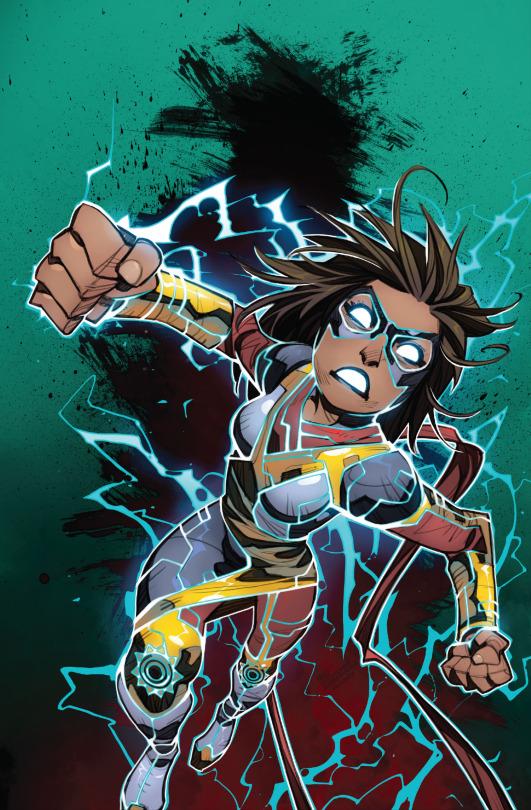
Anticipatory grief serves as the driving focus Ahmed’s story, as it gives rise Kamala’s other two inner conflicts. Anticipatory grief is a form of grieving which occurs before the death of a loved one, and can sometimes result in more severe symptoms than normal grief.
The catalyst for Kamala’s anticipatory grief is her father being stricken with a rare terminal disease that is believed to be incurable. This event coincides with Kamala acquiring her Kree Stormranger Nanosuit and both her parents having their memories of her secret identity erased following their previous adventure on a distant alien planet.

The symptoms of anticipatory grief which Kamala most heavily displays throughout the narrative include sadness, poor concentration & exhaustion, a sense of helplessness, and most especially, anger.


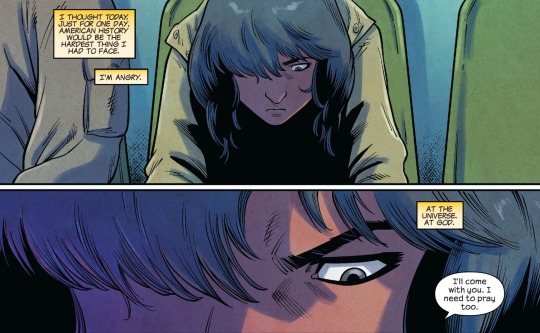
The reason why anger takes center stage in place of other stressful emotions derived from anticipatory grief is because Kamala is also suffering from intense burnout due to her struggling to balance both her life as a superhero and being supportive for her dying father. Burnout is a state of chronic stress and frustration which can manifest itself in the form of chronic fatigue, impaired concentration & attention, and increased irritability. Kamala is shown to be physically and emotionally exhausted throughout the “Stormranger” arc of Magnificent Ms. Marvel not only because of her lack of sleep from superheroing, but also from a combination of struggling to adapt to her new circumstances and her new costume sapping her of energy to power itself.


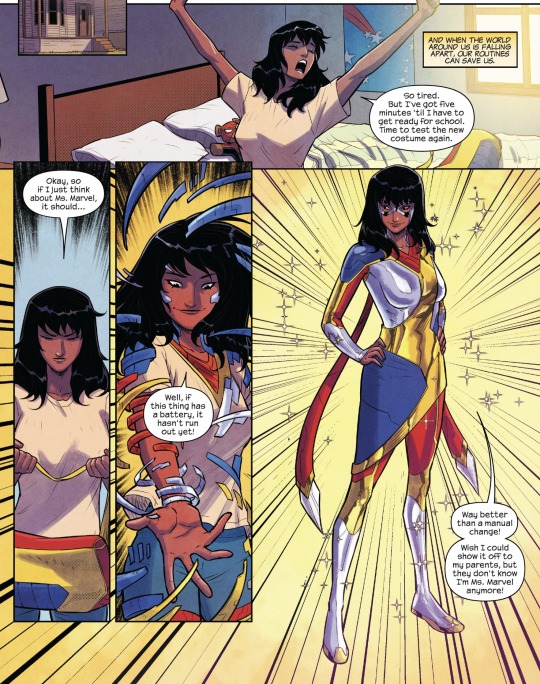
Impaired concentration and attention is evident not just with Kamala falling asleep in class as shown earlier, but also being so overwhelmed by her feelings of grief that she briefly forgets important stuff like Iron Man texting her about a possible cure immediately before her Abu collapsed and was hospitalized. Kamala was so consumed with anger and sadness that she completely forgot about Stark’s text before he himself arrived at the hospital to remind her.
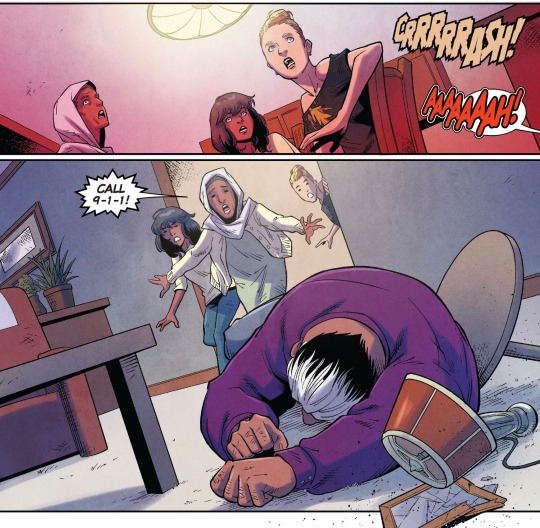
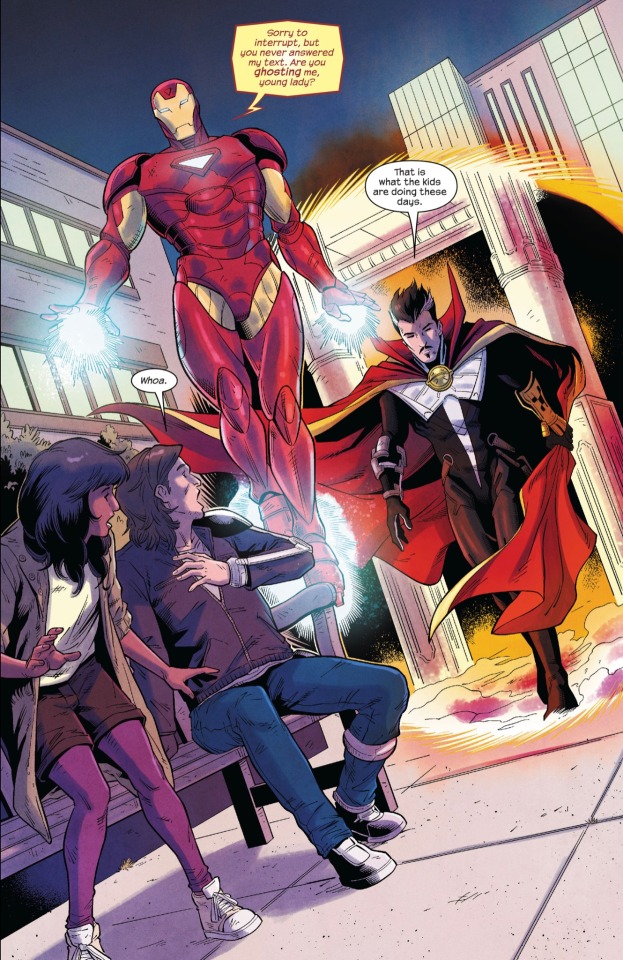
But the most evident aspect of Kamala’s burnout is her increased irritability, as is presented not just in her more agitated behavior towards friends like Nakia or civilians like the doctor Mr. Hyde chased, but also in her becoming more aggressive in superhero fights.

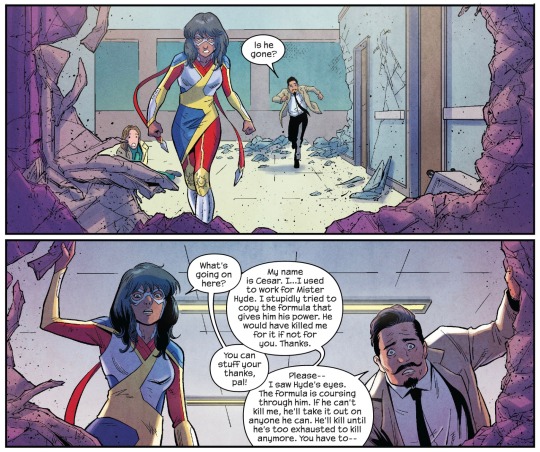
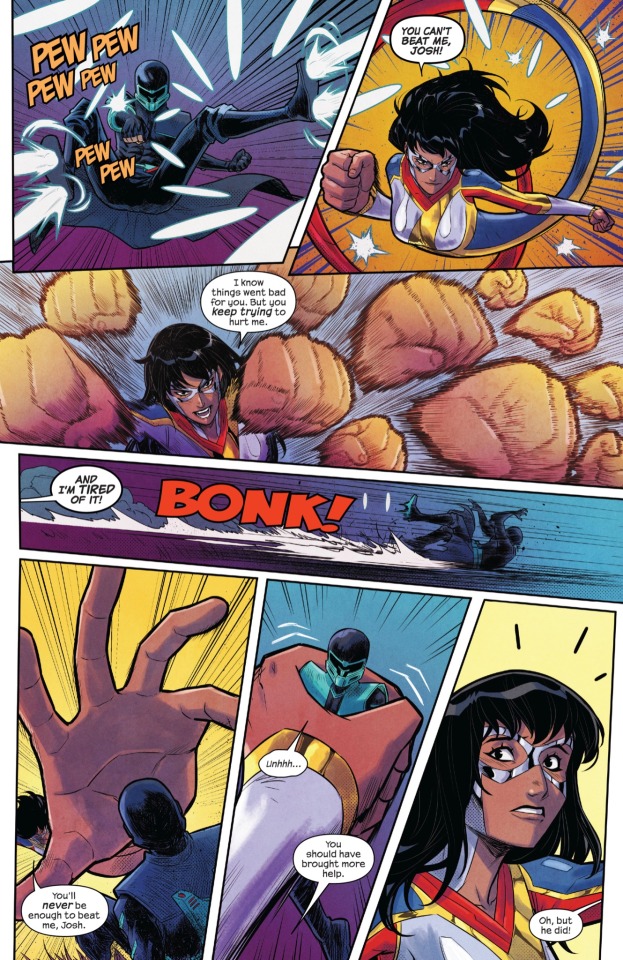
Which leads into the final major theme of the “Stormranger” arc, the dangers of losing oneself to unmanaged anger. Specifically, there is a distinction between helpful grief anger and damaging grief anger. The former is a healthy and necessary part of the grieving process whereas the latter can bring harm to both oneself and to others. While Kamala’s feelings of anger caused by her Abu’s disease and her wanting to express said anger are perfectly natural and understandable, it becomes a problem when she uncontrollably lashes out at others. This is most evident when the A.I. Kamala’s Kree Stormranger Nanosuit (which serves as a physical metaphor for unmanaged aggression) takes advantage of Kamala’s agitated state during battle and unwillingly forces her to nearly kill both Discord & Mr. Hyde.



Kamala's extreme anger on display might seem out-of-character at first, but her behavior makes perfect sense when viewed through the lens of mismanaged grief anger. This can be caused by bottling up more intense feelings despite appearing normal on the surface, consequently resulting in more intense outbursts. In Magnificent Ms. Marvel the reader witnesses Kamala consistently trying to remain calm & supportive to her friends and family, and letting out her grief to others, whilst simultaneously being forced to constantly meet others expectations and unable to express important parts of herself. Which paradoxically results in to Kamala’s increasing state of agitation and anger.
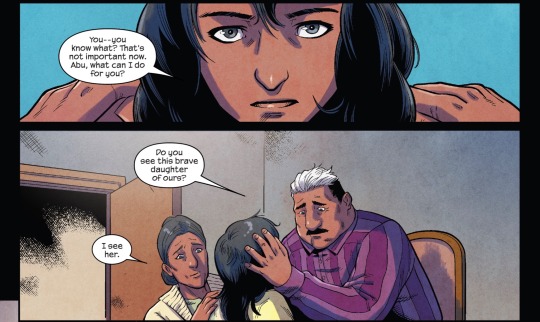


But Ahmed’s story also demonstrates the importance of being allowed to feel and recognize said anger, but to manage it in appropriate ways and not become so overwhelmed by it that we forget who we are. This is perfectly summarized in Kamala’s narration about needing to retreat into our shells but also needing to break out of them when said shells risk destroying us, and Doctor Strange’s narration about how what matters isn’t preventing the future but how we react to it.
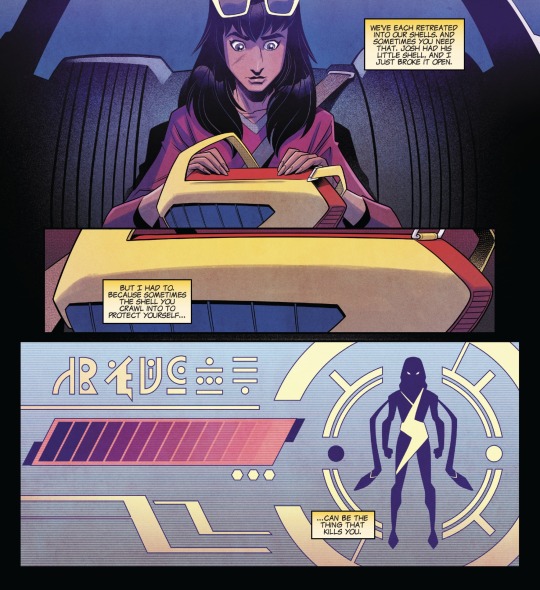

Furthermore, when Kamala finally recognizes Stormranger Nanosuit’s negative influence over her, Kamala not only chooses to do the right thing and by staying true to her moral code instead of giving into the worst possible version of herself, but also acknowledges her anger in a more constructive manner rather than ignoring or abandoning it, as she makes her feelings of resentment towards villains like Mr. Hyde and Discord perfectly clear, but still does whatever she can to protect them from being murdered.

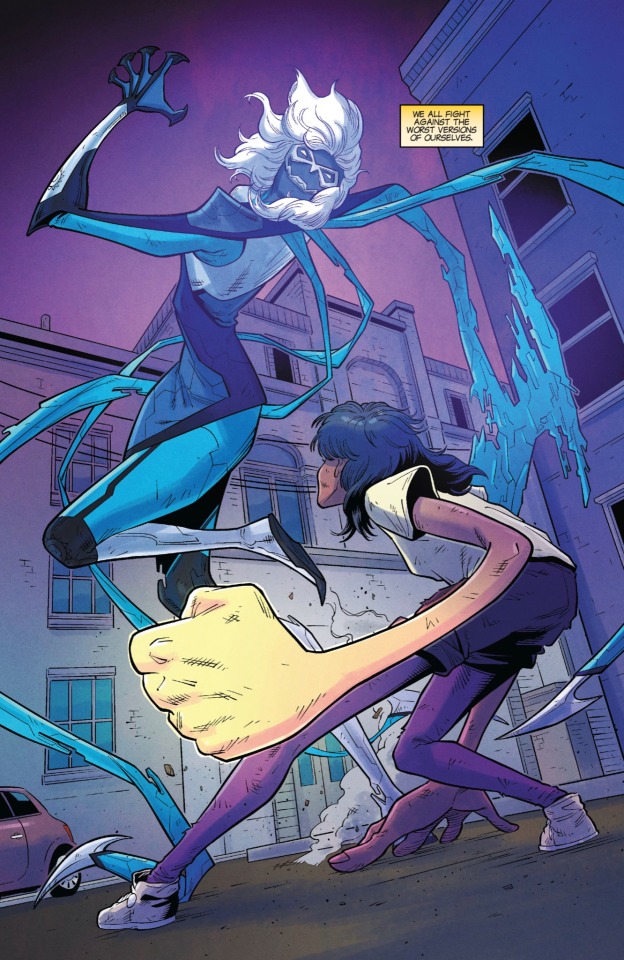


Additionally, the "Stormranger" arc’s two primary antagonists, the titular Stormranger and Mr. Hyde, serve as both dark reflections of Kamala‘s own struggles as well as physical manifestations of uncontrolled rage. Both villains violently lash out at anyone they perceive as a threat or aggressor, and when they’re unable to direct that rage at said threat, they’ll just randomly direct it at a new target until their own rage is what ultimately tiers or burns them out. Burnout is ultimately what results in Stormranger’s downfall as the suit’s systems overclock and she self-destructs.
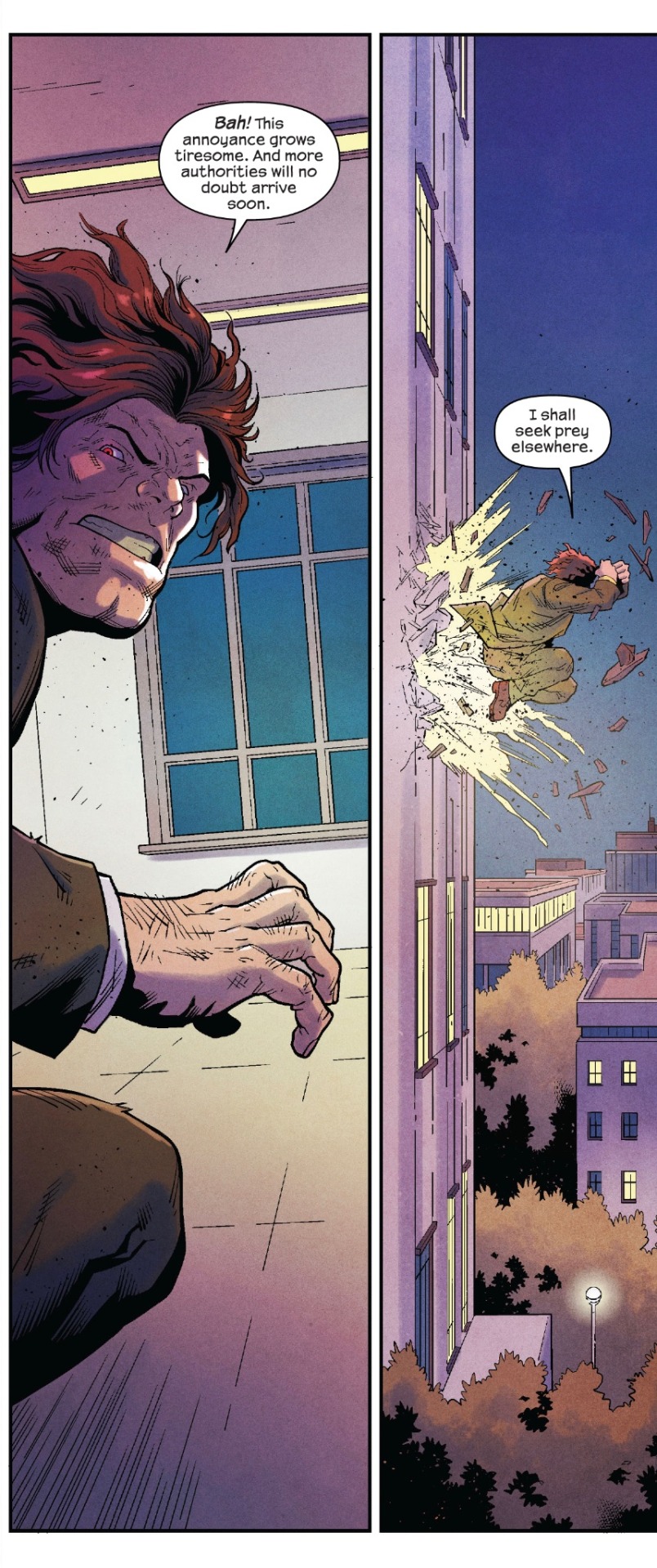



Overall, I really admire the in-depth & subtle ways which Saladin Ahmed conveys themes of anticipatory grief, burnout and anger throughout the “Stormranger” arc of Magnificent Ms. Marvel!
Kamala's arc was one that I could heavily relate to on a personally level, as I had then-just recently lost my Nana to Parkinson's Disease as this series was being released, and was struggling with similar feelings of grief and anger like Kamala was here.
#magnificent ms marvel#ms marvel#kamala khan#saladin ahmed#minkyu jung#joey vazquez#stormranger#marvel comics#mental health#anticipatory grief#mini essay
10 notes
·
View notes
Text
As a Children’s Story for Children: Animals of Farthing Wood
Age I was told midge should be: 4
Quick review: What a weird fuckin little show. Did I like it? Did I not? I don’t even know. If I can find a decent copy before Jewlet is older I would probably not be averse to showing it to her though, it definitely has Watership Down with training wheels vibes.
longer review:
You know, I didn’t really follow when Jetty did part of this show for the Giftening, so all I knew about it was that it was a show about animals people had compared to Watership Down. The nominator for this SPECIFICALLY said they don’t like to do that, and that makes perfect sense to me, as it would suffer horribly by the comparison. I think having been presented this with a specific thought of “Please don’t let anyone tell you this is anything like Watership Down” was incredibly helpful, and actually let me reachy my own Watership Down-y conclusions, while I also, agreeing with the nominator, would never ever use WD to pitch this.
At core, it’s a show about animals being forced to leave their home due to human intervention, and there’s a lot of bad things that can and do happen to them on the way, and there the similarities stop. It’s got a much less serious tone to it, as you might imagine by the fact that all the animals make a pact not to eat each other and it was, at least as far as I got, abided to.
But they do kill a character! Which surprised me, there’s a couple near misses and the newts go “fuck this shit” but then they in fact DO shoot Pheasant’s wife, and frankly it might be the only peace she knows because Pheasant is a fucking asshole. But it’s done fairly quickly and bloodlessly--this isn’t a complaint, it’s a statement--and so that’s why I say the Watership Down with training wheels. Which I think is actually kind of perfect, because it’s done in this way, and, because, frankly, the characterization is a little thin on the ground, the death matters but it doesn’t rock you, in the same way that they could kill nearly any charatcer and I would be more or less fine with it.
I think Badger, Fox, Adder*, and Weasel probably get the most characterization out of anyone, and even then, it’s a bit stock. It’s one of those shows that I think shows its age--I actually do think Children’s cartoons have gotten better--but because we’re sort of thrown into things without being able to understand these characters as much other than archetypes (or less) it makes some of what could feel overwhelming as far as emotional stakes have some distance.
Which, in general, for four year old Jewlet, I like! I like there being hard consequences, but with characters you can hold at a bit of remove. It feels like a good tiptoe into the general thrust that doesn’t deny what happens in such situations, but doesn’t get you emotionally involved first. I think as we get OLDER, that is necessary, because there’s no point in hurting or killing characters if it’s not meant to truly move us and affect the story longterm, but for a little thing, I’m willing to allow the remove, which I find to be a much more elegant solution than “Characters can never really die” or worse, “They can come back”
The dynamics of the group are sometimes frustrating and hard to understand. Some of this is the fact that we have animals with different needs and goals, all teaming up, to cross to a wildlife reserve. When…Toad could easily have stayed when the newts did. Mole could live in a fucking backyard. Fairly certain hedgehogs live in people’s gardens, and I know foxes can handle a certain amount of city or near-city life. Owl might need to seek out more forested area, and I’ll be honest I do notknow what the requirements of a Badger are, but many of the imperiled smaller animals wouldn’t actually need to go the full distance. Now, great news! A four year old is probably not going to think about that. But it could be an interesting thing to talk about “Why do you think the larger animals don’t carry the smaller ones? Why do the mice not stay near the house with a woodpile?” etc.
Anyway, in all, this is the only thing I’ve done for Jewlet that I walk away from not knowing how I feel about it. But even WITH that, if I could find an easy copy, I think this’d be a decent pick for four year old Jewlet, just bedcause I think the strange balance of it really works as an intro to this sort of thing.
*Oh my God, horrifying. So this whole time, I thought the snake was the only one who got a name, and her name was Edda or Ada, I went to go look it up and it’s actually Adder ahaha usually I am not afooled by such trickery, but, you got me.
16 notes
·
View notes
Text
Well, it’s not quite a master’s thesis, but this is (the first of) a series of posts on why Catra and Adora are the best love story in the history of kids TV animation and maybe the greatest love story in the history of TV. This may in some ways be faint praise - romance on TV is generally not very good compared with books or movies. Often it’s just some will they/won’t they sexual tension that is defused by getting characters together and re-heightened by breaking them up. TV is full of nearly shark jumping pointless dramas like Sam and Diane (Cheers, holy fuck am I dating myself, though that was technically before my time), Ross and Rachel (Friends, which was no Cheers) etc, but also some less annoying couples like Ben and Leslie (Parks and Rec) or Amy and Jake (Bk99) who are mostly just kind of cute and fun. Other shows, like the X-Files, teased viewers for years with unresolved sexual tension. In kids shows most romances are, appropriate for their target viewers, mild, sweet relationships based more on self-conscious flirting and blushing than on complex and conflicted feelings or deep passions - which is pretty realistic when the characters are young teens or even mid-teens. Some of these relationships are really well done - Finn and Flame Princess, Dipper and Pacifica (yeah I ship them), the early stages of Katara and Aang (before the showrunners imbued this childhood crush with cosmic significance), Steven and Connie, etc. Catra and Adora, though, are different. Their love story is not a side plot or a sub plot, it’s the heart of the show. It isn’t a childhood crush, it’s a very messy and passionate relationship between two young adults. She-Ra is an emotionally complex lesbian romance just as much as it is a thrilling action/adventure show. Everything about their relationship is baked into the show’s plot, its themes, hell even its musical score. The dramatic tension between Catra and Adora is not the result of stretching out a flirtation for ratings, but a coherent dramatic arc that runs through the entire show. As Noelle said, he made Catradora so central that execs couldn’t take it out without ruining the show. And the show is better for it. In this series of posts I’m going to try to show why, as well as showing why She-Ra is such a fantastic love story.
First off, let’s talk about how Catra and Adora’s character arcs are foils for each other, and how they come together and apart through the series. This is actually a post that I’ve been working on for a while but I keep summarizing the show rather than cutting to the chase, so I’m not going to recite many plot points so much as sketch out what’s going on with the dramatic structure at the time. But also, let’s talk about what each character’s arc is saying, and how they are commenting on each other. Spoiler alert: Catra’s arc is a subversion and critique of stories of empowerment through ruthless self-assertion and revenge, while Adora’s arc is a subversion and critique of chosen one narratives and stories of self-denial and self-transcendence.
When the show starts, Adora and Catra are shown as rivals and friends - their first scene starts the recurring motif of them reaching out for each other as one of them dangles above an abyss, as well as establishing their flirtatious banter and easy camaraderie. We quickly learn that these two young women plan to conquer the world together. These scenes and later flashbacks show Catra and Adora as deeply enmeshed in each others lives, to the point where neither of them (but especially Catra) have clear identities outside of one another. There is so much genuine love on both sides before Adora leaves, but also resentment, envy and fear, especially on Catra’s side, as well as a protectiveness on Adora’s side that deprives Catra of her autonomy. They are both being abused by Shadow Weaver - Catra physically and emotionally, Adora emotionally. It wouldn’t be too much to say that Shadow Weaver holds Catra hostage to control Adora (this is why critiques that Adora abandoned Catra to be abused are actually kind of messed up, since they accept Shadow Weaver’s premise that Adora is responsible for what Shadow Weaver does to Catra). In addition, Catra and Adora actually see the world incredibly differently. Adora already sees the world in terms of right, wrong and her destiny to right wrongs - this is why it’s important for her to accept the Horde’s obvious lies - she couldn’t keep living if she didn’t. Catra, on the other hand, sees the world solely in terms of survival and personal loyalty - everything for her is about preserving herself and the person she cares about - Adora.
Then, when Adora finds the sword, she leaves because it’s the right thing to do. Catra doesn’t even have a concept of ‘the right thing to do’ being something she should care about, or perhaps, something she can care about as an irredeemably evil, awful fuck-up. So at Thaymor neither one understands where the other is coming from, and Catra and Adora begin to part. This is the first turning point in their relationship. Adora chooses duty over what she desires, Catra chooses to protect herself (such as she sees it) and nurse her sense of betrayal and abandonment.
Their relationship until Promise is a kind of weird Frenemy thing that is fascinating to watch and sold me on the show. Neither one wants to fully admit to themselves that the other is now their enemy, neither one has given up on changing the other’s mind. Each is furious at the other, and desperate to see her again at the same time. There’s a lot of heartache and just as much sexual tension, especially at Princess Prom. Both of them come alive when they fight each other (more about that in a later post). But they’re already growing apart - Adora embracing her destiny as She-Ra, Catra rising in the ranks for the Horde. Adora now has the purpose she always wanted, plus other friends and a sense of being chosen to do something great, while Catra now has power - the means to protect herself from people like Shadow Weaver as well as the vindication she had always been denied, and even the opportunity to beat Shadow Weaver at her own game.
The next turning point is Promise. Holy fuck, this episode. It’s an episode that is even more heartbreaking after you’ve watched the show because you know just how much worse things are going to get, and yet, it’s a necessary part of both of their character arcs. Even through season 1 Catra and Adora had remained very much enmeshed in each others lives in an increasingly fucked up way as they grew apart but refused to turn away from each other. Even though they aren’t -exactly- a romantic couple (Adora doesn’t recognize and acknowledge her feelings until the last episode of Season 5), Season 1 of She-Ra is one of the worst breakups I have seen on TV. As I said in a couple of previous posts, this is the kind of shit that the Mountain Goats write songs about. Everything that was poisoning their love for each other even before episode 1 bubbles to the surface and combines with them fighting on opposite sides of the war to make a truly fucked up situation. In the end, it’s Catra that makes the choice to turn away from Adora. This isn’t a -good- decision. It’s spiteful, and destructive, and based on an outright deluded understanding of their relationship (inspired by Light Hope’s manipulations and her own issues), but it’s in some ways a necessary decision. Catra has been so wrapped up in Adora for so long that she isn’t going to be able to figure out who -she- is without cutting Adora out of her life. And the same is true of Adora.
But each of them do this in about the worst way possible. Catra embraces destruction, ambition, manipulation and outright cruelty, turning the tactics of her abusers against them and against everyone around her. She first triumphs over Shadow Weaver and manipulates Entrapta into trying to corrupt Etheria itself. Meanwhile Adora ‘lets go’ and commits herself to the self-denying mantle of She-Ra. Over the next several seasons, their respective paths will nearly lead both Catra and Adora to their deaths (in the Season 4 finale).
For the next season (counting season 2 and 3 as one) Catra and Adora are still closely linked, but as enemies. Still, there’s more than enough flirtation between them (that ‘Hey Catra’ in the first episode of Season 2 is something else), and especially on Adora’s side we see her hold back with Catra, and often take responsibility for the harm Catra inflicts, just like she had when they were kids. Yet they still drift apart - after facing off every other episode in Season 1, they spend less and less time on screen together through season 2 and 3. Catra continues her ascent to power and descent into villainy while Adora becomes more of a stressed out mess as she takes the fate of the world and the wellbeing of everyone she cares about on her admittedly broad shoulders. Catra’s one moment of vulnerability is rewarded by Shadow Weaver’s betrayal and her exile, then Catra triumphs in ruthless badass fashion through sheer desperation and aggression. In the Crimson Wastes, we see Catra at her most independent, and she almost seems happy. But once Adora shows up and Catra hears about Shadow Weaver, she’s sucked back into the worst of her resentments, and she makes very clear that being happy is less important to her than making sure Adora is miserable.
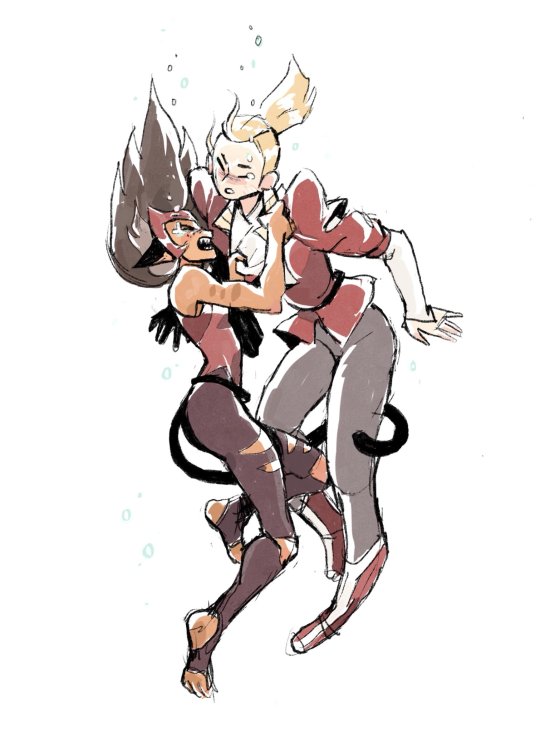
This changes everything. Catra completely breaks with reality and tries to kill Adora, herself and the world rather than lose to Adora and Shadow Weaver (I do think it’s important to remember that she does that after Shadow Weaver nearly kills her). Catra betrays everyone around her when she exiles Entrapta, threatens Scopria and lies to Hordak. Then she flips the switch. When Adora tries to fix things, Catra fights to her own death to make sure that the world disintegrates with her. For her part, Adora fights first to understand what is wrong with the world and then to fix it. Finally she tells Catra that destroying the world is her choice and she has to live with it, decks her, and then sees her off with a death glare once the portal is closed. With this, Adora writes Catra off even if, as she says later, she never never hated her. By doing that, Adora casts off the guilt that had dogged her and takes responsibility for her own life rather than someone else’s - this is actually a huge step for her, and one that will become more important in Season 4.
Season 4 is in many ways the nadir of their relationship. They only see each other once during the entire season, in Fluterrina, when Adora tries to blast Catra, much to the latter’s shock. There’s a sense in that scene that Catra is trying to have the same flirtatious enmity she used to have with Adora, and Adora is having none of it. Catra almost seems hurt by this, which is an early hint at how isolated Catra is beginning to feel. Catra spends the rest of the season at her highest and lowest. On the one hand she spends most of 12 episodes winning by every standard she has ever claimed to care about, besting Hordak himself in single combat and making herself co-ruler of the Horde and coming within a day’s march of ending the Rebellion. In many ways it is the ultimate empowerment fantasy - the abused young woman has defeated her abusers, showed up everyone who doubted her and forced everyone to respect her. But I think it’s striking that the show starts with her and Adora dreaming of conquering the world together and in Season 4 Catra nearly succeeds in conquering it alone, almost like she was trying to live out her old shared fantasy while proving she didn’t need her former best friend.
At the same time, Catra is clearly miserable. She’s always been unhappy, but in Season 4 we see her completely isolated and lying to herself and everyone who will listen in a desperate attempt to justify her actions. Turning the tactics of Hordak and Shadow Weaver against them to gain power and then against Scorpia and Entrapta to maintain it haven’t vindicated Catra, they’ve made her more and more alone as Entrapta is exiled and Scorpia drifts away. Meanwhile Catra reaches out to Double Trouble, and her interactions with them reek of a kind of desperate desire to have someone in her life (the feeling of their interaction is of an unhealthy casual relationship where one partner becomes emotionally invested and the other takes advantage of that while denying the other the closeness they desire). As people leave her, one after the other, it becomes clearer and clearer that Catra doesn’t want power at all - she wants connection, friendship, love, and power is a very poor replacement. As I said in my long Catra rant, Season 4 is both her ‘Walter White as a Catgirl’ season and the beginning of her redemption. Everything comes to head when Sparkles destroys everything Catra has tried to achieve, Double Trouble delivers those harsh truths and Horde Prime shows up and makes it all irrelevant, just highlighting how futile all her struggles and sacrifices and crimes have been.
Meanwhile Adora spends Season 4 becoming her own her and her own woman. After telling off Catra, she grows more and more disillusioned with Light Hope and critical of Glimmer (though the latter has more than a shade of her old habit of taking responsibility for others - Adora’s development is not linear). She’s gained the courage and confidence to strike out her own path, not just follow a destiny. At the season’s end she once again breaks with her best friend to do what is right, and discards the destiny that she was being prepared for. But in this case she isn’t chasing one packaged destiny for another, instead she’s making her own choice and literally shattering the thing that she thought gave her life purpose. It’s badass, and heartbreaking, and along with decking Catra and jumping after Catra into the abyss (see below) it’s the perfect Adora moment.
In many ways Season 5 starts with Catra and Adora farther apart than they have ever been. They aren’t even enemies anymore, they’re completely out of each other’s lives. And both Catra and Adora are lost at the beginning of Season 5 - Catra is useless and alone on Prime’s ship, completely defeated despite ostensibly being on the winning side, and she goes through the motions of her normal plotting without any particular conviction and none of her normal flair. Meanwhile Adora is even more miserable and self-destructive than usual, throwing herself at Horde Bots and working herself until she drops of exhaustion. In a very real way they both stay lost until they have a chance to help the other. Catra takes responsibility for what she’s done and what she can do, saves Glimmer (at least partly for Adora’s sake), apologizes to Adora, and sacrifices herself. Adora only seems to come alive when she decides to turn around, face Prime, and save the cat. And when she does, Catra and Adora’s arcs, which had separated so completely in season 4, come crashing back together to end the series.
Adora during Save the Cat is such a contrast with the uncertain, hesitant and self-destructive wreck we’ve seen so far in Season 5. This is possibly her craziest plan in 3 years of mostly cazy plans, but she never wavers or questions herself. Even when Chipped Catra appears and we see Adora’s heart break while we watch, Adora doesn’t back down or relent. She keeps at it even as the tears stream down her face. She fights better trying to save Catra without She-Ra’s powers than she fought at the Battle of Bright Moon with them. Catra’s just about as desperate - we see her cry and plead, and now is probably as good a time to any to point out how amazing a job both VAs did throughout the show, but especially in this episode, and how good a job the board artists did.
Seeing each other for the first time in a year, and only the second time since Catra blew everything up, Catra and Adora are probably the rawest and least restrained we’ve ever seen them. There’s barely any banter, no bravado, and no pretense that they are anything other than two women who desperately need each other (Prime doesn’t help with ‘You broke my heart’.) Then Catra is flung to her death, Adora jumps after her, breaks both her legs in the fall (we see her crawl to Catra, as though she couldn’t walk) and becomes the real She-Ra. It’s such a triumphant and deeply queer moment seeing a woman transformed into a warrior goddess to protect the woman she loves, and it’s the reason that, as dark as it is, Save the Cat is my Comfort Food episode.
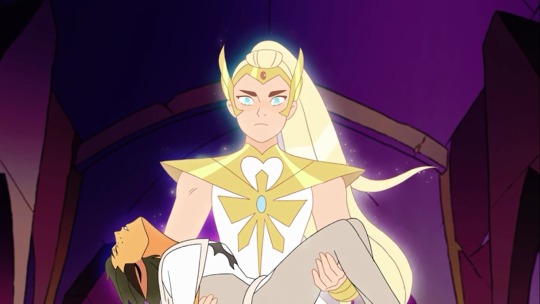
Let’s not sleep on Taking Control, though. This episode is like a microcosm of what this show does best, especially the A plot with Catra and Adora. Catra’s reversion to lashing out at everyone and her refusal to be open to Adora shows just how much of a struggle this whole ‘being good and trying to connect to people’ thing is. Catra’s outburst gives Adora a chance to stand up for herself and refuse to be Catra’s punching bag, while also not trying to control her. Adora’s ultimatum gives Catra a chance to reach out to Adora (quite literally), and allow herself to be vulnerable. In this episode, we see just how far Catra and Adora have come since the messed up stew of their relationship in Season 1. Adora lets Catra be responsible for her own actions; Catra lets herself be vulnerable to Adora and takes responsibility for her actions. They’re both better people and better friends and better partners than they were, and the show has shown this in a strikingly nuanced and realistic way.
The important thing to note in the next few episodes of Season 5 isn’t just how much closer Catra and Adora get to each other and how much they flirt (So much. So much, y’all) but just how -happy- they are. We see both of them transformed in the other’s presence. Basically, since they’ve parted, both Catra and Adora have been defined in no small part by how miserable they often are. They have both had their triumphs and their lighter moments, but there’s been a sense of melancholy dogging both Catra and Adora since episode 1. And now that they’re together again, that lifts, somewhat. Catra’s verbal barbs have lost their venom, and she can openly show how much she cares for Adora and even Bow and Glimmer. She’s still herself - snarky, cynical, somewhat devious - but she’s not engaged in a self-destructive zero-sum struggle with everyone around her. Meanwhile Adora has spent 4 seasons being a neurotic and sometimes nearly joyless mess who takes responsibility for everything and often doesn’t let herself enjoy anything other than the odd BFS group hug (exceptions include trying to uh...impress Huntara and reveling with the butterfly ladies of Elberron in Flutterina). Around Catra, though, she’s a cocky, swaggering jock who gives as good as she gets. It’s a side of Adora we’ve only seen hints of before, and one that’s so much more confident and joyful even as the world is ending around her. Apart, Catra had tried to protect and vindicate herself with power and conquest, while Adora had tried to forget herself in duty and sacrifice. Together, they can be themselves again. This dynamic is crucial to the show’s portrayal of Catra and Adora’s romance because it doesn’t just show how much they love each other, but how they’re -good- for each other now that they’ve grown as people, and that they are so much better than they were when they were apart.
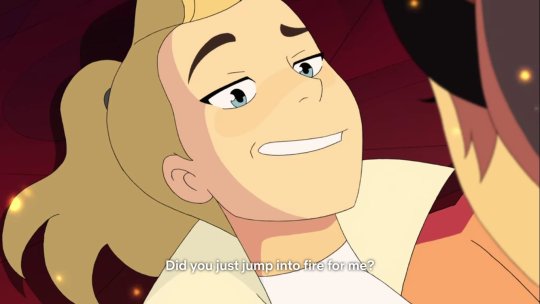
Until Shadow Weaver shows up. Their old abuser reintroduces tensions but even then things are different than they were. Now Catra isn’t just resentful of how Shadow Weaver prefers Adora - she’s protective of Adora, which is clearest in Failsafe when she calls Shadow Weaver out for being willing to sacrifice Adora. And while Adora takes the Failsafe, it isn’t to follow her destiny or because she has a death wish - it’s because she loves her friends, and she is the only one who has any hope of doing this and living (though Catra’s suggestion that Shadow Weaver take it is a good one). And finally, when Catra leaves Adora, it isn’t because she hates Adora, nor, despite what she says, is it because she really thinks that Adora chose Shadow Weaver. At least, not exactly. It’s because Catra loves Adora, and can admit that to herself, and can’t stay around and watch the woman she loves sacrifice herself rather than choosing Catra. Before Catra leaves, she asks Adora ‘What do you want?” It’s a question that echoes Shadow Weaver’s speech in Episode 1: ‘isn’t this what you always wanted since you could want anything?’ As much as Adora has grown as a person, and defined herself and stood up for what she thinks is right, she still has never answered that question - it’s never been ‘what do I want’ but ‘what do I have to do?’ and that’s how Adora answers Catra’s question. This is Adora’s last gasp as a self-transcending hero, letting go of what she wants (not that she ever dared articulate what that was) in order to do what must be done. And it nearly kills her and dooms the universe, because Adora can’t be the hero that she needs to be by being anyone less than herself.
But it’s losing Catra that inspires Adora to tell off Shadow Weaver for good (not that she’d ever really warmed to her after season 1). And it’s love for Adora that inspires Catra to stand up to Shadow Weaver and demand that she do the right thing. In both cases, Catra and Adora aren’t just standing up to their abuser, but holding her to account for the harm she’s caused, and it’s the love that they have for each other that inspires them to do this. In Catra’s case in particular her refusal to let Shadow Weaver weasel out of finding Adora is a much greater triumph over Shadow Weaver than beating her up and breaking her mask in Season 1 - it’s proof not so much to Shadow Weaver but to Catra herself that Catra really is better than this and that she deserves better than this. It’s not turning her abuser’s tactics against her, but truly holding her to a moral standard and demanding that she do the right thing.
And then there’s Catra and Adora together at the heart. Catra has already come back for Adora and stayed to the end, choosing to die with her even if she can’t share a life together (not out of some death wish, but because Adora needs her). And Adora, who’s been avoiding answering the question for three fucking years, finally let’s herself want Catra when Catra finally confesses her love (breaking the last of her self-protective shields) and asks Adora to stay -for her-. And by admitting what she wants, Adora can truly be at peace with herself and be the hero she needs to be, lesbianism saves the universe, The End.
So anyway, that’s how Catra and Adora’s stories are woven together and how they compliment and comment on each other. Narrativiely, Adora and Catra start together, come apart, find something of themselves, and truly find themselves and each other when they are reunited. Thematically, they are critiquing seemingly opposing narrative tropes - empowerment narratives and narratives of self sacrifice. But by showing the flaws in both types of story and showing how neither self-seeking empowerment nor self-negating self sacrifice can actually make us happy, She-Ra asks and answers more profound questions than most prestige dramas for adults do. I’ll get into how the show sells the idea that the power of love can bring us happiness (and save the world) in a future post. But next up, I’m going to celebrate just how much Catra and Adora’s relationship revels in ambiguity, complexity and contradiction and so tells a grown up love story in a kid’s show.
#she ra#she ra spoilers#she ra adora#spop#catradora#she ra netflix#she ra and the princesses of power#goat ship#long#meta
557 notes
·
View notes
Note
You're confusing head canon with canon.
How so? I’m assuming this is in response to this post.
Loki, throughout all of his MCU appearances, is motivated by a desire for love, praise, adulation, etc. Loki did not want the throne in the first Thor film. He admitted so himself and his actions during that movie largely support this. He even says this again during his show, leading me to further believe this is true and he wasn’t lying. Which, granted, he is known to do....

Loki wanted Odin’s approval in the first Thor film. That is what drove him throughout most of the movie. He snuck the frost giants into Asgard to postpone Thor’s coronation, not to seize the throne. Loki wanted to prove to Odin that Thor wasn’t ready yet (and he was right, sorry not sorry.) He didn’t want the throne himself. This plan succeeded, but Loki couldn’t leave well enough alone and he goaded Thor to go to Jotunheim. And we all know how well that went….
Odin rescued them, but not before Loki discovered he was Jotun. His parents never told him about his heritage because they “wanted to protect him from the truth." If they truly thought there was nothing wrong with him being Jotun, why would they have felt a need to protect him? Asgard is a prejudiced civilization. They colonized the other eight realms and, judging by their rhetoric against them, largely think themselves above them. They nonchalantly call the Jotuns monsters, compare Midgardians to goats, and refer to the Dark Elves as creatures. Thor and Loki grew up with stories of Asgard’s greatness and, for the most part, believed them for most of their lives. When young Thor proclaimed he would “hunt the monsters down and slay them all,” Odin only told him not to seek out war. He said nothing about the negative language used to describe the Jotnar, even with young Loki present. It was completely normalized.
When Loki confronted Odin about his heritage, he referred to himself as “the monster parents tell their children about at night.” That language didn't come from a vacuum and he is directing it not only at the Jotuns but at himself. When he fought Thor at the end of the film, he told him he would “destroy that race of monsters.” Loki holds a lot of self-loathing towards himself for a multitude of reasons, but I'll settle on his heritage for this post. He thinks little of the Jotnar and so thinks little of that part of himself. He blamed his heritage for his feelings of inadequacy when compared to Thor.
I would make an argument that Loki feared Thor after he learned of his heritage, too. Thor vowed to destroy all of the Jotun as a child, he wanted to “finish them together” with Odin, and he told Odin in the Bifrost that “the Jotuns must learn to fear me just as they once feared you.” I think Loki lied to Thor about Odin’s “death” to keep him from interfering with his plans for Jotunheim, but also because he was afraid of him. I can’t find the reference, but I am almost positive that Hiddleston himself confirmed this at some point of time. (Btw, I don’t think for one second Thor would have hurt him, but Loki is an emotionally stunted idiot.)
All of this leads me to be highly skeptical that Loki from Thor 1 would proclaim himself as the “rightful king of Jotunheim” and freely use the Casket of Ancient Winters in front of the Asgardian army. He was still deeply ashamed of this fact at this time and would not have wanted it known. (He supposedly overcame this by Thor 3, but I don’t think the narrative earned it. The movie told us he came to accept it enough to put it in a play, but it didn’t show us how he got to that point. Regardless, he was certainly not emotionally at that point during Thor 1.)
Also, at the very least, the Casket should have revealed his Jotun form, which it didn’t.
After he discovered his heritage, Loki’s motivation was to prove himself a worthy son of Odin by any (terrible) means necessary. In the end he failed to destroy Jotunheim and Thor destroyed the Bifrost. Even while hanging from the edge of the bridge, Loki sought Odin’s validation, which was denied. Loki was as low as he could be and he let go. He landed on Sanctuary I and Thanos found him. I’m aware there are a bunch of theories about what happened next, but I really don’t want to get into them here because that is all they are really. Theories. Nothing solidly confirmed in canon.
Regardless, something happened between Thor 1 and Avengers 1 that twisted Loki into the would-be conqueror of Midgard. That desire was born out of his anger towards Thor and Odin after Thor 1. Loki said he wanted to be king in Avengers 1, but really he wanted to exact revenge against something Thor held dear. He wanted to hurt Thor. He wanted the adulation a throne would give him. He did not think he could have Odin’s love so he would at least have Odin’s respect as a king. He wanted Odin to see that he was just as worthy of a throne as Thor and him - which is batshit crazy but so was Loki in Avengers 1. Even Coulson knew Loki didn’t know what he wanted. “You lack conviction.” A throne would never have made him happy and I think, as messed up as he was, even Thor 1 Loki realized this.
I completely believe that Thor 1 Loki would come to Earth and even seek to destroy it to avenge his brother’s death. And he was definitely unstable enough at the time to do so– see Jotunheim. Despite everything he says to the contrary, Loki loves Thor. I do not believe that when everything was settled at the end of that episode that Loki would seek to rule Earth though. He had no motivation to do so yet. That only came after he fell from the Bifrost and met Thanos. I would have believed it more if he had betrayed Fury in the end of the episode and still tried to destroy Earth, but not to rule it. Thor 1 Loki giving his Avengers 1 “you were made to be ruled” speech at the end of that episode comes across like the writers just copied and pasted their favorite moments from the movies into the show without an understanding of the motivation behind them or why those moments worked in the first place. It’s sloppy writing and in the end, disappointing, because I for one would love to see a story tackle an unstable Thor 1 Loki hell-bent on avenging his brother’s untimely demise whilst dealing with all of his other issues. I’m here for the premise, not the execution.
I would have also rather have seen HYDRA taking out the Avengers than Hank Pym. It doesn’t make sense in canon that HYDRA allowed the Avengers to form under their control. It would be in their vested interest to eliminate this threat before it would take them out. However I don't know enough about Hank Pym's character, so I'll leave this here.
I also think it was naïve of Sif to tell him that Odin wouldn’t want him to destroy Earth. When Frigga died, Odin wanted to destroy all of the Dark Elves even if that meant the destruction of Asgard. I’m on the fence about whether Loki would have halted an attack at her council. They famously dislike each other and Loki and Odin are cut from similar cloths. Would he stand down if he was that angry? Or would he heed her words since, at this time, he so desperately sought Odin’s approval? It’s food for thought....
#loki#odin#thor#what if#what if spoilers#spoilers#thor 1#avengers 1#marvel negativity#here goes....#meta#marvel meta
92 notes
·
View notes
Text
Katara's Grief
(This is my first attempt at a meta post and I know that this has probably been already done but I just needed to get it off my chest and go on a little rant and it kinda got long so bear with me.)
A lot of the hate on Katara stems from the fact that she keeps on mentioning her mother's death at every chance she gets and invalidates other people's pain to assert that her suffering is the worst of the lot.
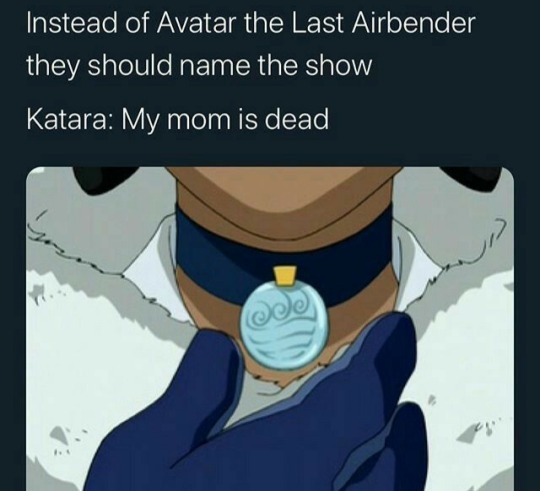
And even though everybody is entitled to their own opinions, I'm gonna point out why I think the aforesaid claims are not exactly correct.
First we'll take a look at; Katara's Backstory:
We know that Kya is killed in a fire nation raid and that Katara had been the last person to see her alive before she leaves the tent on her mother's insistence. Only to come back a few moments later and find her dead body. This, in itself is a traumatising event.
So yes, her mother died. Other people in the story go through far worse. You're not wrong when you say that.
But what is more important in Katara's story is the aftermath of her mother's death.
As Sokka says while talking to Toph in "The Runaway" in B3 Ep7:
Sokka: When our mom died, that was the hardest time in my life. Our family was a mess, but Katara? She had so much strength. She stepped up and took on so much responsibility. She helped fill the void that was left by our mom.
As an eight year old, she had to force herself to grow up to step into her mother's shoes and raise herself and her elder brother and simultaneously look after the entire village after her father left to fight in the war. She had to do all of it by herself.
In face of all her responsibilities, she never really had the chance to simply be a grieving child lamenting the loss of her mother. She habituated herself to caring more about others than herself (We see this trait in the entire series as she acts as the stand-in mom friend for the entire Gaang with an exception of Suki and Zuko). She ended up bottling her feelings of grief, resentment, guilt and rage deep within herself.
She had to give up an extensive part of her childhood where most children focus on figuring themselves out, to become a mature and responsible person who was working as the immovable pillar holding up the family and even the whole village not much later.
She put up a strong front to help others and pretended to be fine even though she was hurting inside the whole time.
She could never find any closure from the situation. She never got over it.
Moving on to the criticisms:
1. Katara keeps on mentioning her mother like a broken record:
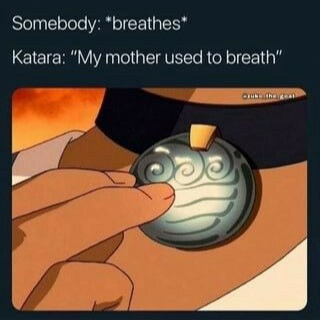
Here are the number of times Katara mentions her mother's death (not sure if that's all of it, lmk if there are any others):
1. In her first scene with Sokka
Katara: Ever since mom died, I've been doing all the work around camp while you've been off playing soldier!
2. A short while after she meets Aang
Katara: Well, I just want you to be prepared for what you might see. The Fire Nation is ruthless. They killed my mother, and they could have done the same to your people.
3. A short while after she meets Haru
Katara: I lost my mother in a Fire Nation raid. This necklace is all I have left of her.
4. A short while after she meets Jet
Katara: Sokka and I lost our mother to the Fire Nation.
5. In the swamp after she sees a vision of her mother
Katara: I thought I saw Mom.
6. In the Crystal Catacombs with Zuko
Katara: I don't? How dare you! You have no idea what this war has put me through! Me personally! The Fire Nation took my mother away from me.
7. A short while after she meets Hama
Katara: We completely understand. We lost our mother in a raid.
8. Repeated mentions in The Southern Raiders episode
(Most of the episode basically)
The first mention with Sokka is in the middle of a siblings' spat where she tells off Sokka for trying to act as if he were superior when it was obvious that in the face of the gaping hole that was left by Kya's sudden death, Katara had shouldered much more responsibility.
When she tells it to Aang, she uses it as a proof that the Fire Nation is capable of immense cruelty and destruction.
The Gaang travel all around the world and meet different people affected by the war in different ways. So when Haru, Jet and Hama narrate their own stories, Katara sympathises with them and talks about Kya's death in lieu of "I understand, the Fire Nation hurt me too."
After they got separated, Aang, Sokka and Katara each had their visions and after they get back together, they all mention their visions and so does Katara.
When left alone in catacombs with Zuko, whom she considered as the face of the Fire Nation— the same Fire Nation that had her mother killed and forced her father to leave to fight in the war, she has a meltdown where she rightfully accuses him of all the bad things he's done and then breaks down while talking about how the war has cost her i.e., by causing her mother's death.
The Southern Raiders is the episode where Katara hunts down the man responsible for her mother's death. If you think mentioning Kya repeatedly in this episode is uncalled for, then I don't know what to tell you.
In all the incidents mentioned above, Katara mentioning her mother's death is a very natural occurrence is the respective conversations. She mostly talks about Kya's death to either extend her sympathy or to use it as an example of the ruthlessness of the Fire Nation.
Another fact to be noted is that 70% of the Gaang's storyline is followed via Katara from a narrative point of view. Plus, being the mom-friend, she acts as the spokesperson. Considering that Kya's death is a major event that played a huge role in shaping Katara's life and is also the source of her severe, unresolved trauma, which acts as the driving force of her story, it is only natural that she brings up this topic whenever she is engaging in a deeper conversation.
It is us as the viewers who have seen her from the start and already know about her mother's death and we see her talking to multiple people about it. Which is why it might come across as repetitive to some people.
While, Kya's death is not necessary information that everyone needs to know, Katara talking about it never comes across as a forced or unnatural.
2. Katara invalidates others' pain because she thinks she has suffered the most:
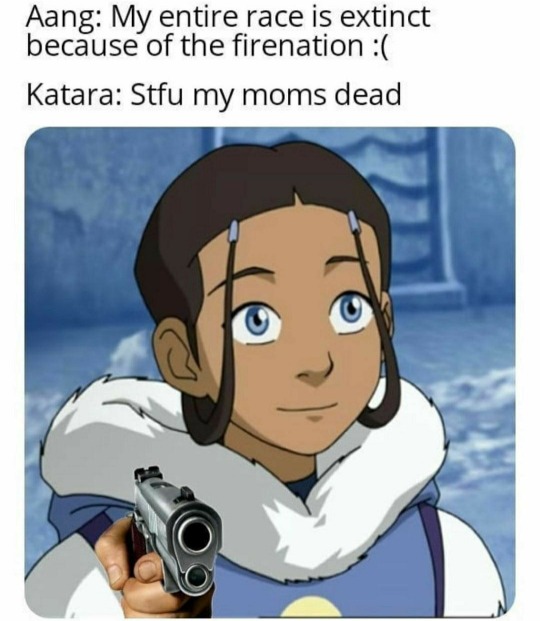
First of all, if anything, Katara is the most empathetic person of them all. As the mom-friend of the group, not only is she their constant moral support, she also helps them untangle and sort out their own feelings. She is also able to tap into issues that aren't said out loud.
Instances of Katara helping and supporting Aang, emotionally are uncountable.
She is the first one to notice Sokka's sour mood in B3 Ep4 "Sokka's Master". And even though his insecurities seem baseless, she validates him (by saying "I'm sorry you're feeling so down" instead of something like "That's a dumb thing to say") and knows exactly what to do to cheer him up.
In B3 Ep7 "The Runaway" she has the insight to understand that Toph's unruly behaviour is caused by the mixed feelings she has about her parents even though Toph's herself never talked about it.
She even reaches out to Zuko in B2 Ep19 "Crossroads of Destiny" even though she used to think of him as the face of the enemy.
But then there's The Southern Raiders.
Ah yes, that episode where Katara is extremely OOC and a total b*tch.
Agreed that she said some things that she definitely shouldn't have said. But like, she's just 14?? And has been hurting on the inside since she was 8?? And pretended to be fine just for the sake of other people?? Like, there's a limit to how much she can have her shit under control?? And she did a real good job of Sokka's upbringing and taking care of the village and taking care of Gaang on her own?? Some people out there are really willing to forget everything she has ever done just because she was mean for 5 minutes?? A traumatised 14 yo shouldn't be villianised and called toxic because she got mad and lashed out at people that one time??
But here's my take on the scene anyway:
When Aang gets to know that she's going to go face her mother's killer:
Aang: Um ... and what exactly do you think this will accomplish?
Katara: I knew you wouldn't understand.
Aang is a non-confrontational person who prefers running away from difficult situations as opposed to Katara who firmly stands her ground and is never afraid of confrontations. Katara had approached Aang only hoping that he would understand. But going by his dismissal, he obviously doesn't understand the burning need that she has to confront the man who had single-handedly destroyed her childhood. (Most people infer that what Katara means is that she thinks that Aang doesn't understand the pain of losing people. And so does Aang, I guess)
But things start getting even more tricky when:
Aang: Katara, you sound like Jet.
In all honesty, this is probably the most insensitive thing that she could've heard from anyone right then, let alone one of her closest friends. Hearing herself being compared to a homicidal maniac just because she wants to avenge her mother's killer. (No, I'm not justifying murder but there's a clear difference between homicide and avenging someone's death. And Aang may not be my favourite character but I do love him but this wasn't really a good thing to say either. And he wasn't even mentally distressed in the very least to be completely lacking tact or a filter.)
And then the situation escalates:
Sokka: Katara, she was my mother, too, but I think Aang might be right.
Katara: Then you didn't love her the way I did!
After 6 long years of Katara bottling in her dark feelings and letting them fester inside herself, she is finally letting them out and the first things she faces in a span of few minutes are outright rejection, invalidation of her feelings, comparison to a homicidal maniac and nothing akin to the unconditional support that she has provided to everybody. Her own brother tells her that he is siding with the boy who just compared her to a homicidal maniac.
Yes, accusing your own brother of not loving your mother enough is a very cruel thing to do. But both Sokka and Katara know that she doesn't entirely mean it.
But also, there is one very important factor in here:
In B3 Ep7 "The Runaway", Sokka says to Toph:
Sokka: I'm gonna tell you something crazy. I never told anyone this before, but honestly? I'm not sure I can remember what my mother looked like. It really seems like my whole life, Katara's been the one looking out for me. She's always been the one that's there. And now, when I try to remember my mom, Katara's is the only face I can picture.
Katara overhears this conversation just as Sokka had meant her to.
This dialogue lets us know that Sokka's coping mechanism has made him suppress all memories of Kya and replace them with memories of Katara in order to attain a semblance of normalcy.
Both Katara and Sokka had very different ways of coping with Kya's death. Katara pressed down her feelings and tried her best to pretend to ignore them while Sokka partially succeeded in forgetting her.
When Katara first hears these words she is shown to be crying. But if she were to remember these very words while she was justifying herself infront of her own brother and a close friend for wanting to avenge her mother, it would've had a negative impact on her.
In her rage, she would've thought: "Of course he doesn't want to avenge mom. Because he doesn't think it's worth it and that's because he doesn't even remember enough of her to be mad about her death."
And for someone who has spent each day of the last 6 years trying to fill in the shoes of her mother and experiencing her absence everyday, the idea of forgetting her mother is a ridiculous concept to her.
Her thoughts would have quickly derailed to: "He didn't love her enough to remember her."
In light of these thoughts, saying "Then you didn't love her the way I did" doesn't feel out of the blue.
No, I am definitely not justifying what she said, I'm just laying out a possible explanation to why she said what she said.
Yes, she should've apologized to Sokka for this and I think that they definitely should've had a long conversation about their mother's death and how it affected them. Between Katara supressing her feelings and Sokka supressing his memories, i don't think they ever had this conversation.
But sadly we are given neither of these scenes.
Tl;dr: Everytime Katara mentions her mother, it's with good reason and I don't think it's fair to call a character toxic when they lack a mind to mouth filter for 5 minutes and say some mean things. And considering all that Katara has done for everybody, it isn't fair at all.
Peace out!
#antis really be out there ignoring everything she does to hate on her because of two lines she said#nvm katara is one strong badass girl stan her for good grades and clear skin#katara#atla#atla meta#meta analysis#avatar the last airbender#water tribe#kya#sokka#hakoda#gaang#atla gaang#avatar gaang#zuko#aang#toph#ira's posts
1K notes
·
View notes
Note
I hope this is not too much of a hassle but by any chance could you do an analysis on Watts, Tyrian, and Hazel.
Hello anon!
Sure, no problem :) I think I have shared some thoughts on these three characters in other metas, but I’ll get this chance to organize them and to put them all together.
In general, I would say Watts, Tyrian and Hazel are not extremely deep characters and they mostly work as foils to others, drive subplots in specific arcs and highlight themes.
Here is a list of their major narrative roles, as for now.
1) They symbolize three parts of Salem:
Each member of Salem’s inner circle represents one side of her.
Watts is her entitlement.
Tyrian is her desire of destruction for the sake of destruction.
Cinder is her wish to be free.
Hazel is her inability to grieve.
They are Salem’s three flaws. The reasons why she ends up the way she is.
Salem’s journey starts because she is unable to grieve:
Salem: No! No! What did you do?! BRING HIM BACK!
And because she feels she deserves better than others:
God of Light: When you first came to me, I did pity you. But it is clear now that your selfishness and arrogance have led you astray.
Finally, she enters the pool of Darkness and embraces destruction:
Jinn: Instead, it created a being of infinite life with a desire for pure destruction.
At the same time, Tyrian and Hazel also represent Salem’s inability to understand the cycle of life and death:
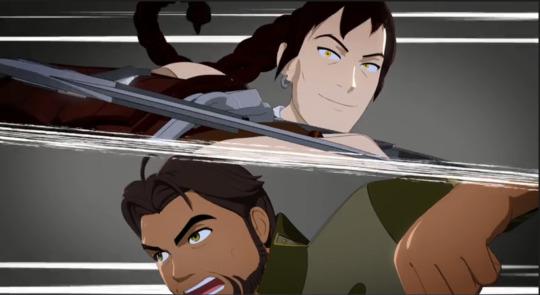
God of Light: You must learn the importance of life and death. Only then may you rest.
The cycle is about loving life and accepting death. However, Salem initially refuses death (like Hazel) and then starts despising life (like Tyrian)
Interestingly, Hazel is eventually able to understand Gretchen’s choice:
Hazel: I'm doing what Gretchen would have done!
And dies sacrificing himself for others, just like Gretchen did.
I wonder if Tyrian’s death will be something which will instead be linked to him finally aknowledging the importance of life. Since Tyrian is a very negative character (and I do not think he will have a redemptive or particularly empowering death) it might be something as simple as him begging for his life.
2) Watts, Hazel and Tyrian all act as the main secondary villain of a specific arc and they are linked to the main theme of that arc.
a) Hazel fights in the Battle of Heaven and he is linked to Knowledge:
Oscar: Did she know the risk of being a Huntress?
Hazel: She was only a child! She wasn't ready!!
Oscar: She made a choice!
Knowledge is complementary to Choice. It is what you must aquire to choose wisely. However, initially Hazel does not understand it. He dismisses Gretchen’s choice as a her being tricked and he himself lacks the knowledge to make the right decision.
This is why his turning sides is linked to the relic of Knowledge:
Jinn: Why, hello again, old man. Did you have a question for me?
Hazel: Actually, I think all my questions are answered now.
He finally understands the truth and is able to choose:
Oscar: What are you going to do?
Hazel: What Gretchen would have done.
b) Watts displays his hacking abilities to its fullest in the Atlas Arc. This connects him to the theme of Creation and in particular to its negative declination aka Control:
Cinder: You said in your message that you have control over Penny.
Watts: I said I had Penny under control, not that I could telekinetically force her to do whatever I want.
He hacks Penny and overwrites her will. Moreover, he himself ends up manipulated and “controlled” by Cinder:

Cinder: You deserve this, Arthur. We'll be back.
c) Tyrian has roles both in the Mistral Arc and in the Atlas Arc. However, he misses from the climaxes of both, so I think he will be important in Vacuo and maybe he’ll find his death in that arc. Moreover, the theme of Destruction seems to fit his character.
Finally, when it comes to themes, Hazel, Tyrian and Watts all explore the theme of trust (aka one of the main themes of the Atlas Arc) in a minor way.
To be more specific, the theme of trust is explored throughout the story in different ways. I have explained it better here and here.
It is interesting because the theme of trust is explored starting with Ozpin, Oscar’s foil, who does not trust others, so our protagonists feel betrayed. However, in Atlas they find themselves in Ozpin’s shoes and must choose if to trust Ironwood or not.
Here, we explore a form of conditional trust. This idea is presented by Ruby, who wants to be sure it is safe to trust Ironwood. So she keeps secrets and studies him until she decides she can trust him… only to discover that was not the case immediately after. This happens because trust can never be completely safe. Actually, in its most negative declination, this kind of trust becomes the control symbolized by Ironwood.
No matter what, trust is always a leap of faith. This is why trust is a risk. Oscar shows this concept well. He decides to still trust Ironwood at the end of volume 7, but it does not work. Still, he does not stop and decides to trust Emerald and Hazel. This time his trust and faith are repaid. He is fred and gains a new ally.
Anyway, even if trust is worth it, the exploration of this theme in Atlas actually ends on a negative note. It ends with Cinder who is an enemy of trust because she uses others’ trust and feelings against them.
In short, we are shown what trust is through Oscar, what it happens when there is no trust through Ozpin and how trust can be twisted and manipulated through Cinder.
Well, Hazel, Watts and Tyrian explore these same ideas in their subplots.
Tyrian takes advantage of the lack of trust among Robyn, Clover and Qrow:
Tyrian: It's taking a very long time for this show to get to the good part.
He exploits it and manages to kill Clover because of it.
Hazel shows the power of trusting others instead:
Oscar: You want him to trust us? Then trust me.
Oscar’s trust makes him willing to listen and later on he decides to help the kids escape.
Finally, Watts is used and discarded by Cinder, who fakes trust and friendship towards him and Neo.
3) Hazel, Tyrian and Watts all foil a member of Ozpin’s group and show their flaw in a clearer way.
Hazel foils Ozpin himself:
Hazel: He didn't tell you my tale, did he, boy? I thought you looked familiar, to think that evil was inside you when our paths first crossed. Your blood won't be on my hands, it'll be on his.
On one hand Hazel accuses Ozpin of sending kids to their deaths, while hurting children himself. On the othet hand Ozpin speaks about the importance of making choices, but does not give all the knowledge necessary to make an informed choice. So, both characters earnestly believe in their ideals, but they are also hypocrites about them.
Watts foils Ironwood.
Watts accuses Ironwood of having used his genius only to dismiss him later on and does not aknowledge how he himself has taken advantage of Atlas society that leaves those below (like Cinder) to rot. Moreover, both Ironwood and Watts frame themselves as rational, but lose precisely because they dismiss the importance of feelings for both manipulation (Watts) and trust (ironwood).
Finally, Tyrian foils Qrow.
In particular, Tyrian embodies Qrow’s self-destructive tendencies, which are Qrow’s true flaw. As a matter of fact Qrow ends up hurt in both fights (the first tiem physically, while the second time emotionally) not because Tyrian is stronger than him. He ends up hurt because of his flaw.
In Mistral, his misunderstanding with Ruby leads to him being poisoned. This happens because Qrow is so scared of his semblance that he keeps others away and does not explain himself.
In Atlas, his cynism leads him to make a pact with Tyrian and this leads to Clover’s death.
4) Finally, Hazel, Watts and Tyrian all foil a member of CEM:

I have discussed Emerald and Mercury’s foiling with Hazel and Tyrian here and here.
Hazel and Tyrian step in as Emerald and Mercury’s parental figures once Cinder leaves them behind.
Hazel is Emerald’s positive parental figure, but he is blinded by his flaw, just like she is.
Tyrian is Mercury’s negative parental figure, but he also tells the boy truths he needs to accept.
At the same time, Hazel is what Emerald really wants (an adult who looks out for her), while Tyrian is who Mercury thinks he wants to be (a big bad man). In both cases, they are not what Emerald and Mercury really need. Emerald must learn to be more independent, while Mercury needs to nurture his positive relationship(s).
I have discussed Cinder’s foiling with Watts here, here and here.
Watts embodies Cinder’s flaw (her hunger for power) enveloped in everything she hates, but also deep down envies (being an Atlas elites).
It is interesting that Watts is not really a mentor figure for Cinder (differently from Hazel and Tyrian for the murder kids). He is a colleague, so they are on equal footing. Interestingly, though, they both try to discredit the other and to act as the other’s superior.
In general, this is another way to convey that Cinder is less child-coded than the two kids she took in.
At the same time, it shows how Atlas makes relationships between equals difficult because in Atlas everyone always tries to be on top and discards the ones below.
5) Hazel, Watts and Tyrian’s arcs, when they exist, are very short and simple.
Moreover, they are built on what ifs.
What would happen if Hansel lost Gretel?
He would stay a prisoner of the Witch forever, until he manages to free himself doing what his sister would have done:

In a sense, Gretchen still frees Hazel, not physically like in the fairy tale, but psychologically because she inspires him.
What would happen if Watson were envious of Sherlock?
He would join Moriarty and end up consumed by his own envy:
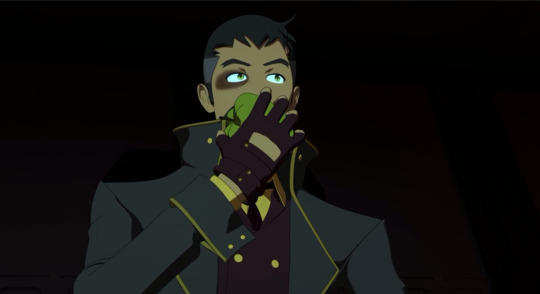
Watts is shown eating a green apple while controlling a falling Atlas. This is interesting because Atlas is the house of our titular Snowhite and green is a color associated with envy. It is as if Watts has taken the bait Cinder offered him using his feelings of entitlement and jealousy:
Cinder: You have everything you need?
Watts: Oh, believe me, this is everything I've ever wanted.
His arc is also a clear case of wants versus needs. He gets what he wants, ignoring that this is not what he needs.
What would happen is the Scorpion killed the Frog, but survived?
The answer is that he would keep making pacts he breaks (like the one with Qrow) and would keep poisoning others (both physically or psychologically).
This until he leads himself to his own demise, just like his fable counterpart.
Thank you for the ask!
#rwby#rwby meta#hazel rainart#arthur watts#tyrian callows#salem#qrow branwen#ozpin#james ironwood#cinder fall#emerald sustrai#mercury black#murder kids#rwby murder kids#asksfullofsugar#anonymous#my meta
67 notes
·
View notes
Text
Breaking Down Griffith’s Coping Mechanisms: Repression v. Self Harm
CW: extended discussion of self harm and suicidal ideation, images of torture, mentions of CSA
For anyone interested, here is my very long breakdown of how I read Griffith’s state of mind and coping mechanisms (1. repression and 2. self harm) working throughout the Golden Age of Berserk. I think this reading provides an explanation as to why Griffith acts the way he does in some of his more obtuse and “irrational” scenes (the river, Charlotte), and how these actions eventually lead him to becoming Femto at the end of this arc.
Miura may not have planned all this out explicitly, but I think he has a good understanding of the psychological reality of why people repress and why they self harm, and the story proceeds accordingly.
This essay is basically a psychological deep-dive and a reworked version of a very long conversation I had with @bthump last year, it’s taken me a while to get back to this because life n stuff.
The content of this analysis is basically going through the GA scenes where Griffith acts in a self-destructive way and explaining how and why this happens and how it informs his actions in the story more generally.
If you don’t like or understand Griffith, I would invite you to give this analysis a shot anyway, because a lot of Griffith’s story takes place in the subtext of the Golden Age, and it takes a liberal helping of interpretation to figure out what’s going on. This of course is just one reading of Griffith’s character, but as I hope to show, there remains a consistent logic behind his actions that governs his impulses to act in the way he does throughout the story.
Okay, enough preamble, let’s jump in.
On Griffith’s Guilt
So first off, we have to ask why Griffith acts in these self-destructive ways in the first place. Basically, what are his coping mechanisms are responding to – why are they necessary at all?
I think it’s pretty clear that the heart of Griffith’s pain, coping mechanisms, and self-destructiveness is his guilt. More specifically, this guilt comes from the belief that he is cruel and evil because he’s willing to continue to pile up bodies and walk that corpse-laden path to the dream, to put others in harm’s way for his own sake, to devour others’ dreams for the sake of his own.
We see this in the flashback with the doll-knight boy, when his guard slips in front of Casca:

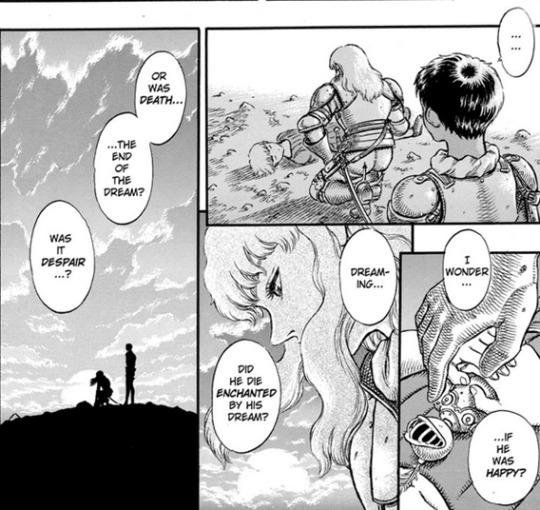

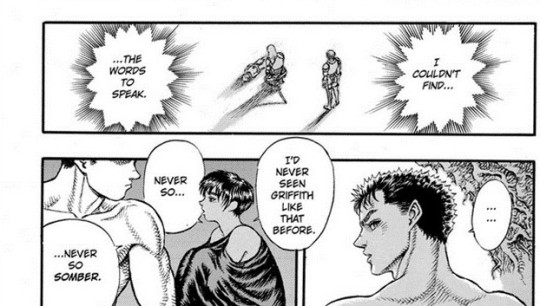
Casca specifically flags for us that this is a significant and unusually revealing moment for Griffith, where he shows a sliver of what’s underlying his implacable façade as a mercenary leader.
Another moment where we see Griffith’s guilt directly expressed is in “Tombstone of Flame: Chapter 2.” This scene shows us more explicitly that his guilt is bound up in his pursuit of the dream and the cruelty it takes to make that dream a reality:

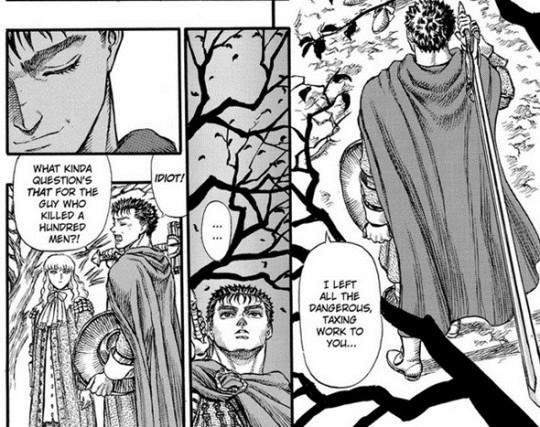
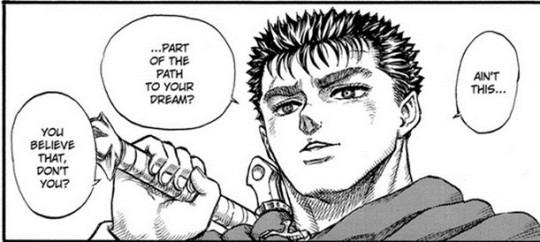

From this scene, we can understand that to Griffith, his “cruelty” is specifically associated with walking the path to the dream, and alongside this, his willingness to put others in danger while he himself remains out of reach of harm’s way. These are both shown to us as things he hates himself for, given that he self harms directly after these scenes (with Gennon and with the second set of scratches – and if you need evidence that the latter happens, bthump has broken this down here).
This “cruelty” that lies at the heart of his guilt is why the guilt trip the Godhand take him on during the Eclipse cuts so deep, because throughout that sequence, the Godhand emphasize exactly that aspect, his cruelty, and no other part of him (such as his remorse, his intentions to create a more equal world, etc.).
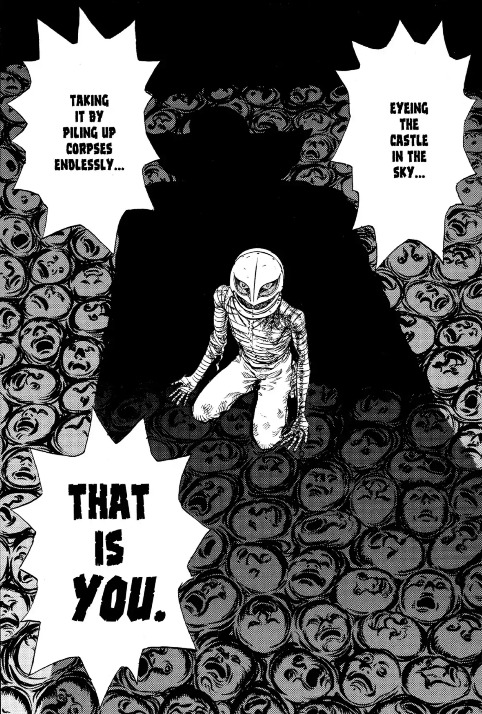
On Griffith’s Repression and Resentment of his Dream
Alright, so we know why Griffith feels guilty. The next question is how Griffith responds to this – I’m suggesting here that it’s through a dual combination of repression and self harm. So, why does Griffith repress and why does he self harm?
Generally speaking, he represses to make himself feel better. This is basically the act of redirecting his feelings – telling himself that the guilt/pain he experiences over pursuing the dream doesn’t matter because all of these acts of cruelty are in fact justifiable, because they agreed to it, because he thought about this logically, because fate said it was OK, because he feels nothing, because, because… It’s basically every time he puts aside his feelings in pursuit of the dream.
Griffith’s repression involves rationalizing away his feelings in order to retreat to a space of emotional safety as an escape from his self hatred and the guilt he feels over his willingness to pursue the dream. The repression exists to smother the negativity he feels about the dream (and what it takes to get there) however it possibly can. And it is in this way that Griffith’s ability to attain his dream becomes closely tied to his ability to repress his guilt over wanting to and trying to obtain it. The repression and the dream basically go hand and hand.
However, it’s important to acknowledge that Griffith’s repression also walks a delicate line, because it attempts to excuse the corpses for the sake of the shining end goal as the ultimate justification for all the bodies, effectively justifying death with more death in a vicious circle, where the guilt continues to grow larger and larger into a mountain of bodies that is eventually visualized for Griffith directly in the guilt trip.
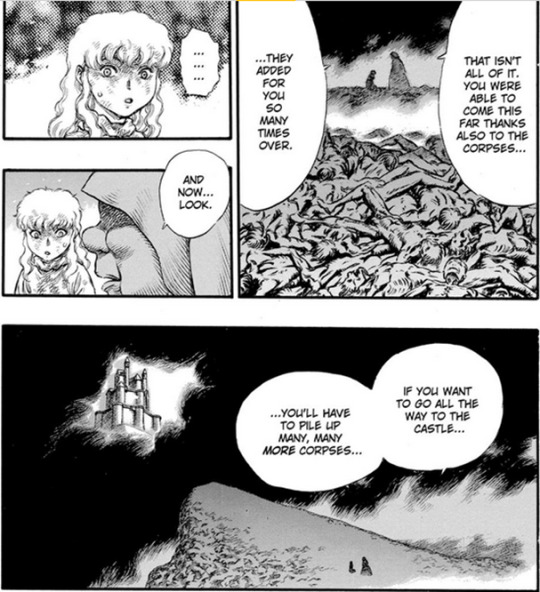
To make a bit of a subtle distinction here, it's not exactly that Griffith’s ability to repress his guilt over all of this becomes necessarily weaker the more the bodies pile up around him, because the increased body toll simply demands the need for greater and greater justification. In other words, it asks that he make a huge sacrifice for a huge gain – the eclipse for a utopia, basically.
However, we see that how this plays out in practice is that Griffith’s repression works against itself if not in the short run, in the long run because it ends up feeding this vicious circle. His repression feeds and intensifies his self loathing because it effectively enables more death, which in turn necessitates the greater need for his coping mechanisms and with it a stronger and stronger ability to repress those negative feelings. So if his ability to repress ever falters, what’s waiting in the wings is an increasingly difficult-to-justify mountain of death, guilt, and self hatred.
And not only that, if we dig a bit deeper, his ability to repress also feeds his self loathing directly, even as its entire goal exists to suppress it – because if he hates himself for his “cruel” willingness to walk the corpse-laden path to the dream, and the primary way he’s able to do this is because of his repression, then his ability to repress, to put on the mask for the sake of continuing the dream, would also be something he (unconsciously) hates about himself.
And in fact I think we see some of this resentment over his ability to repress his guilt finally acknowledged in the Godhand’s guilt trip:

Read: “That’s right, I knew what this was doing, what I was excusing, what I was encouraging, and I found a way to do it anyway.”
If Griffith’s repression is what enables his cruelty, when his ability to repress falters and he’s left only with his self loathing (as we see in in the guilt trip sequence, or even to a lesser degree with Casca in the river sequence), he is thus also hit with the resentment and self hatred not just over his willingness to repress his guilt but over the dream also, because this is what all this evil has been done in the name of: this is the ultimate cause. “It’s a blood-smeared dream after all.”
Of course we can see that Griffith is still able to functionally rely on the dream as a coping mechanism all the while implicitly resenting it throughout the Golden Age, but only insofar as he’s successfully able to repress the negatives that threaten to undermine its ability to function. After all, that’s why he needs to repress his guilt over the dream in the first place, because he cannot justify pursuing the dream if he confronts that guilt directly – it’s basically always threatening to overwhelm him.
And so, as soon as the mask of repression begins to slip, this underlying resentment makes it progressively harder to put on the mask and convince himself that the dream is worth all this death and cruelty. As we see in the river scene, once overcome by negative feelings about the dream – that the dream may in fact be able to excuse nothing, it may be ultimately nothing other than a monument to his own cruelty – the repression slips and he reverts to self harm, and he can only snap the mask back in place when he realizes that other people still need him to keep up that façade.
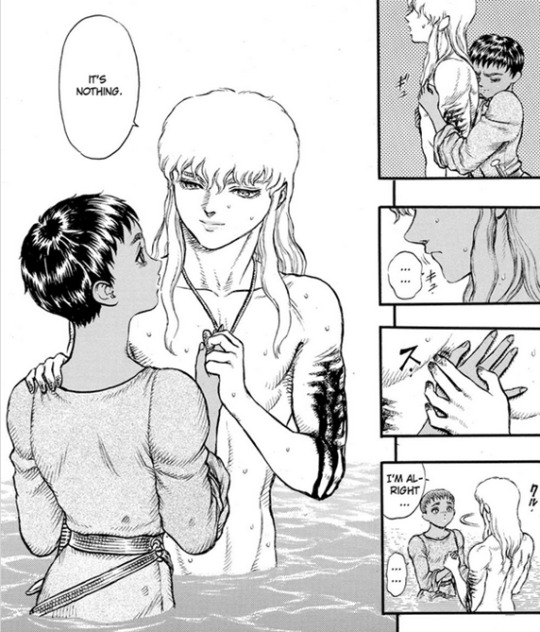
Griffith’s repression is essentially, at its heart, a precarious coping mechanism – it is intrinsically set up to undermine itself. The repression feeds and strengthens Griffith’s feelings of self loathing and his need to turn to self harm as a backup coping mechanism, which is effectively threatening to burst through the surface at any moment.
As we’ll see in the next section, his self harm in turn functions to invalidate his belief in the positive aspects of the dream (basically that it can still redeem him or his actions), and with it his ability to repress his own negative feelings.
This is essentially why I read the climax of Griffith’s Golden Age arc being the collapse of his coping mechanisms and his belief in the dream – because it hangs on his ability to successfully repress the negative feelings he has about the dream, and it hangs on two coping mechanisms that work at cross purposes from one another.
On Griffith’s Self Harm
Okay, so we’ve been over why Griffith feels guilt and how his repression works, but how does his self harm function in the story? First, let’s look at what it does for him emotionally.
There are a couple reasons people generally self harm – one of the main ones is that it can serve as a distraction from our problems and emotions, allowing people to focus on the pain in the moment to the exclusion of everything else. This kind of self harm would function like repression in Griffith’s case, because it would bury the guilt with a sort of distraction, by smothering it with a different kind of pain.
Now I don’t think that’s how Griffith’s self harm works, for a couple of reasons.
Firstly, it’s because none of the instances of self harm we see textually in Berserk actually function to help him forget or diminish his guilt or self loathing over pursuing the dream, and instead are oriented around the opposite, leading him to focus on it instead.
In the river when he’s scratching himself, he’s almost doing it subconsciously, like he’s not even paying attention to what he’s doing, and he’s instead thinking about what he’s talking about: the dream, specifically the negative aspects of the dream:

Throughout this scene, he’s not focused on his own self-inflicted suffering as a distraction, he’s focused on his own guilt from pursuing the dream. His suffering is positioned here as a direct consequence of his guilt.
Similarly, when he’s fucking Charlotte he’s thinking about Guts leaving and rejecting him, not getting lost in what he’s doing with her.
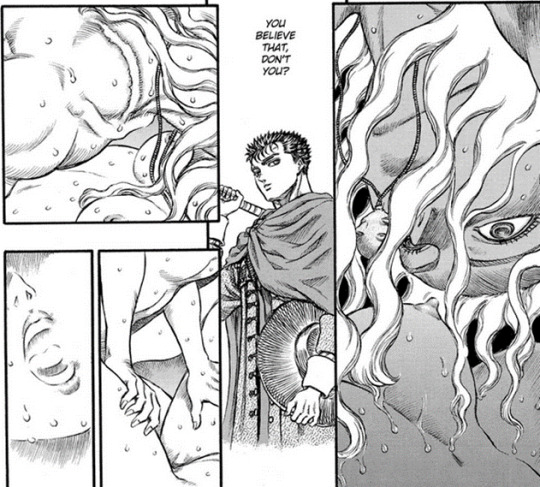
Neither of these two instances of Griffith’s self harm are functioning as distractions from his pain, they’re about intensifying it. So, why would he want to intensify his pain?
It’s because the self harm is Griffith’s backup coping response – it’s what seeps out when the repression isn’t strong enough to bury the guilt. It’s what happens when he’s hit with the full intensity of the self loathing, guilt, resentment, etc. that his repression usually protects him from. Given that he’s essentially being overwhelmed by his self hatred, it makes sense that he would want to feel worse as a result, because this is him accepting and becoming all-consumed with the idea that he is evil and cruel, and he thus “deserves” to suffer.
It is in this way that the self harm serves as a punishment in Griffith’s eyes: “dirtying” himself is essentially meting out justice, effectively giving him what he “deserves” for his own cruelty. In his eyes, this is him reaping what he’s sown.
Basically, the second reason why I think the self harm doesn’t function as a distraction is that it seems to be more centred around penance through his own suffering. The strongest evidence for this again comes from the river scene:
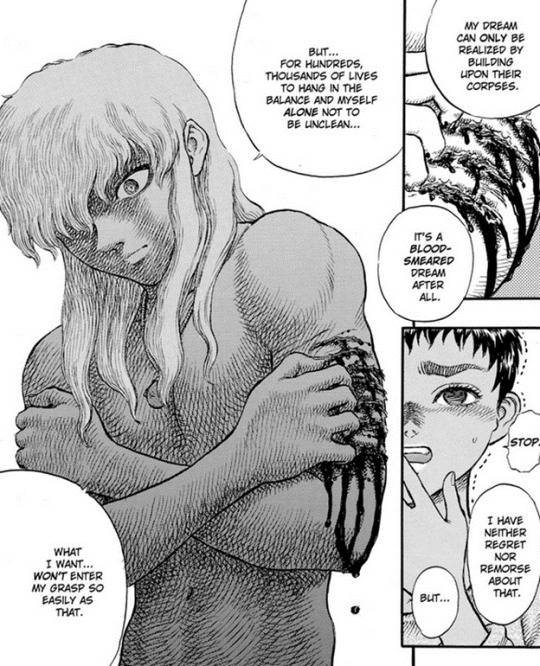
“[F]or hundreds, thousands of lives to hang in the balance and myself alone to not be unclean…”
This part of his monologue clearly sets up his own suffering (“dirtying” himself) as both punishment and atonement for his guilt over putting other people’s lives in danger.
Digging into this a bit deeper, Griffith is still essentially trying to prop up the dream here through his self harm, by trying to position his own suffering as constructive to his end goal. If the guilt threatens to tell him that none of this is worth it, the self harm in this instance is Griffith telling himself that it can be if he is just punished enough for it. (“What I want…won’t enter my grasp so easily as that.”)
This monologue shows us that in Griffith’s mind, his own suffering may be directly given up in response to the suffering of others. It’s what’s being offered in “exchange” – basically, if he becomes unclean enough (read: suffers enough) it’ll make all those hundreds and thousands of lives that hang in the balance “okay” (and you can see how this is some shaky and desperate logic).
In construing his self harm as a sort of atonement for the lives he’s put on the line for his dream, he is trying to absolve himself through his own suffering. This moment in the river essentially shows us Griffith’s thought process as he is in the process of self harming: “If I suffer and atone for this, then it will all be okay in the end, I can still attain my dream because I will have paid my dues.”
However, while Griffith tries to make this impulse to self harm constructive, as we’ll get into in the following section, we can see that this is still always fundamentally destructive to his goals because it always makes him feel worse about himself and his own actions, and that impulse to feel worse can easily spiral out of control when faced with a growing mountain of bodies and a shrinking sense that he can offer up anything in penance or justification for it.
This choice of the word “unclean” here basically serves as a signpost to explain why Griffith takes every single later action he associates with “dirtying” himself throughout the story. This idea of “dirtying” himself is obviously extremely loaded – these acts which make sure he’s not “unclean” are communicated as acts of self-imposed suffering that take place as a sort of punishment after he acts “cruelly” (this is not him putting himself in harm’s way during battle, he does that anyway), and they’re acts that he himself explicitly views as loathsome and disgusting.
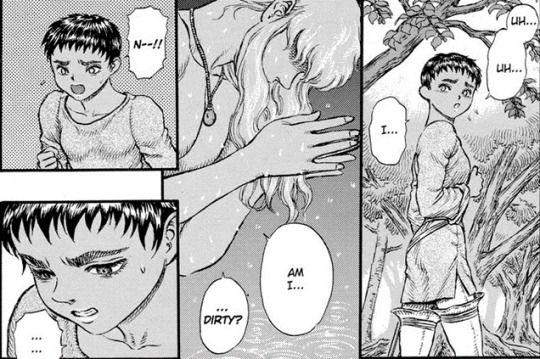
It’s clear that he views having sex with a child predator in similar terms to scratching himself – to Griffith, “dirtying” himself is essentially his self-imposed punishment, and he’s basically trying to construe that punishment as productive by positioning his suffering as in some way equivalent to the suffering of others (basically, “if I suffer too then that’ll make their suffering okay”).
This is also why, as we’ll get into in a minute, if he doesn’t view his suffering as “worth” anything, it becomes impossible to view his suffering as equivalent to the suffering of others. And that’s also why the more the suffering and the bodies pile up around him, the more difficult it is to rationalize his suffering as equivalent to all of this pain and horror.
This is basically the process of how Griffith rationalizes his self harm, this is how he construes it as a productive enterprise instead of a self-destructive one – this is the logic that links his self harm with achieving his goal.
And clearly it’s logic that’s resting on some supremely precarious ground.
Repression v. Self Harm
In order to see how my readings of Griffith’s self harm v. his repression play out, let’s revisit a few key scenes in greater detail before we get into discussing the wider implications of this in terms of Griffith’s story and the sacrifice as the culmination of all of this.
Let’s start with Griffith’s interchange with Guts in Tombstone of Flame:




This conversation basically proceeds as follows: do you think I’m cruel? -> yeah, but you believe the cruelty is necessary, don’t you? -> yes, you’re right, all of this is cruel, and I am too, so I deserve to be punished for it -> self harm with the second set of scratches.
That smile – that same smile as with the doll-knight boy, and indeed the same as the sacrifice – is Griffith being overwhelmed by self loathing. This is not repression. This is not “You’re wrong, I’m not cruel/it doesn’t matter because [denial/rationalization/repression/justification],” it’s “You’re right.” This is me. I’m cruel, a monster, and therefore I deserve to suffer.
And indeed, all three examples of that same smile (the river, Tombstone of Flame, and the sacrifice) lead to acts of self harm. In this case, this isn’t an example of him trying to justify or bury the guilt and pain and horror or build up his defences like the repression would, it’s him justifying an act of self-destruction to tear himself down, because he thinks he deserves it.
To really dig into this distinction, let’s turn to another example of how Griffith’s self harm works in contrast to the repression, and return to the scene where Griffith scratches himself in the river.
First of all, he’s scratching himself here because he feels guilty over putting people in harm’s way for the sake of his dream (a feeling which is specifically kicked off by doll-knight boy but I think it’s made pretty obvious that this is just over people in general), while denying this guilt out loud and spewing his BS rationalizations to Casca.

Both the self harm and the repression are working in response to the same guilt here. But why doesn’t he stop with the rationalization? Why is it narratively or psychologically necessary that he also self harms at all here?
It’s because the denial (i.e., repression) isn’t strong enough to smother the guilt – and yeah, it’s because his rationalization is flimsy as fuck – basically it boils down to “I don’t feel responsible because I am a being of pure logic.” Which: lol
Again, the rationalization exists here to suppress Griffith’s negative feelings, the guilt, self-loathing, and monstrousness – this is him telling himself the guilt doesn’t matter, basically trying to push it away so he doesn’t have to emotionally confront it, because “I thought about it logically […] I don’t feel at all responsible…”
But we see that the rationalization isn’t strong enough, and the self harm is what seeps out when the rationalization can’t bury his self loathing. When the self harm takes over directly after this, the tone of this exchange changes and specifically swings toward the negative aspects of the dream: as he gets deeper into scratching himself, he becomes more and more dream-negative, i.e., focused on how his dream is built on corpses:
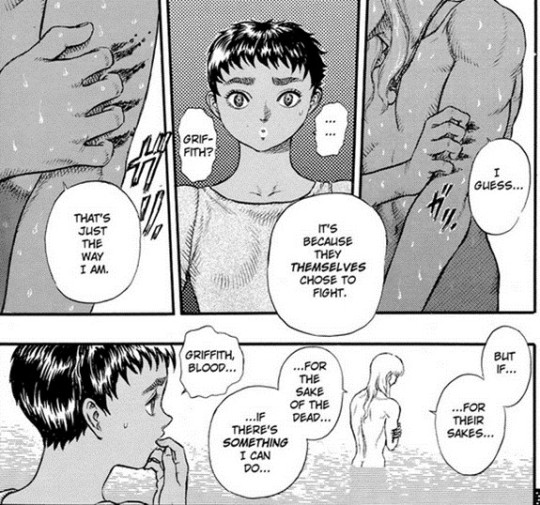
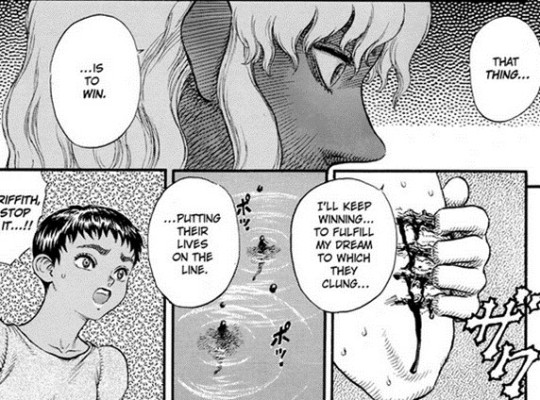

We’re being visually told that his answer to this, his way to make sure he’s not unclean, is to not only have sex with a child predator, but also pay that debt through his blood and suffering. The self harm is justifying his self loathing and guilt in a different way than the rationalization is, not telling himself that “the death is okay because [repression],” but instead “the death not OK – I hate myself and I need to atone for this, which will hopefully make it OK in the end.”
And importantly, as mentioned earlier, as soon as Griffith gets a stronger angle in this exchange – protecting Casca instead of protecting himself – his repression snaps back in full force and he reins in the self harm immediately.
I see this moment as especially significant to understanding how Griffith’s self harm works, because it shows us that the self harm cannot uphold itself as a coping mechanism, it’s basically destined to collapse on itself.
This is because in order to believe you can atone for something through your actions, you have to believe that your actions, your own suffering, has worth. And since the self harm is premised on tearing himself down, as he gets deeper in the hole of self harm, it becomes more and more difficult to believe that his penance is worth a damn. It’s just as much of a balancing act as the repression is, except that it specifically hinges on Griffith’s sense of self worth… so it’s pretty much destined to spiral out of control.
To reiterate, why is the self harm still a defence mechanism if it’s designed to make Griffith feel worse and emphasize the negative aspects of the dream over the shining end goal?
The river scene shows us how Griffith’s repression works in relation to his self harm – when the repression falters, the self loathing that has him focusing on the road of corpses gets him dangerously close to thinking that the dream isn’t worth it, and obviously he can’t live with that because then he’s left with nothing. The self harm (at least in the case of the scratching and Gennon) functions as the last line of defense against that sneaking suspicion that the castle cannot in fact redeem all of this death – because it asserts that maybe the dream can still be worth it if he suffers and atones for his actions. Again, the evidence for this is in the river scene:
“But… for hundreds, thousands of lives to hang in the balance and myself alone to not be unclean… What I want…won’t enter my grasp so easily as that.”
That last part indicates that he essentially still wants to want the dream here, and the self harm is basically what’s allowing him to do so, to continue on the path to his dream through his suffering as penance.
Yet even as this recuperative logic works to some degree in the river scene, this belief is still founded on the (shaky) assumption that his own suffering is worth anything in exchange for the suffering of others. That’s why, to me, it seems apparent that Griffith’s self worth plays such an important part in the breakdown of his coping mechanisms, and why it makes sense that at a certain point he reaches such a low that the self harm no longer becomes penitent, it becomes only punishment. This is the point where self harm becomes self destruction, and this is exactly what happens with Charlotte.
On Griffith’s Self Harm as Self Destruction
We know that Griffith having sex with Charlotte and his subsequent taunting of her father work differently than with the scratching and Gennon, because unlike these two cases, these instances of self harm involve him throwing away the dream too (or at the very least in the former case, putting the dream directly into jeopardy) – casting it into the fire along with all the other “frightening and sad things.” Like with his later suicide attempt and the sacrifice, this isn’t an example of Griffith still wanting to walk the path of the dream, this is him reaching the point where the dream no longer seems worth it, and we know this because he takes steps to actively throw it away (though I do think this understanding is still operating largely instinctually/unconsciously until the soup-behelit, as I outlined in my previous meta).
Throughout the torture sequence, as he goads the King into viciously beating him, we see that Griffith verbally associates his own failure (by implication – he is clearly referring to himself as well as the King throughout this sequence) with his worthlessness.
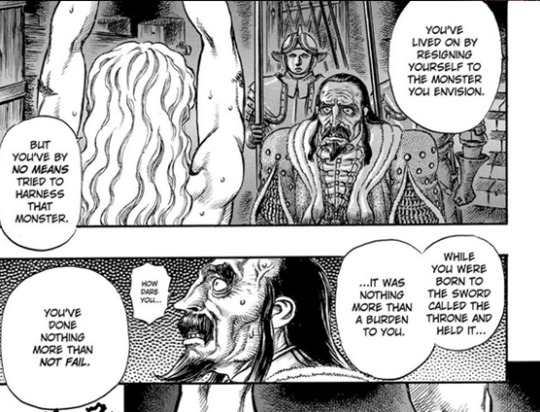
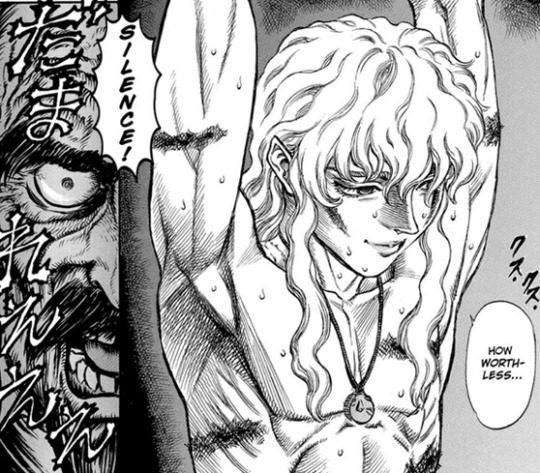
At this point, Griffith is masochistically relishing in the fact that he basically cannot offer anything to anyone anymore – his penance is no longer worth anything to anyone, and all that remains is the suffering he thinks he deserves.
This is the first time we see Griffith’s self harm not being mobilized in a remotely constructive way. Getting beaten doesn’t have anything to do with attaining the dream, this is a naked display of the belief that Griffith thinks he deserves to suffer for his actions without the veneer of his suffering functioning as penance. This is now simply his punishment, for daring to try to pursue the dream in the first place.
This exchange effectively reveals the naked truth to us – that Griffith’s self harm reflects his desire to suffer for what he’s done to others. Even though he may have pretended in the past that this desire to suffer for his sins can still in some way still be constructive to his goals, this moment shows us that ultimately it’s not. Here we’re seeing directly that when Griffith’s self worth is low (i.e., when he feels like shit), all he wants to do is suffer more, and that’s basically the rub.
And yeah, of course that’s how it works, because this is exactly how we see his self harm working throughout the story. Whenever he feels guilty/cruel/dirty, we watch him self harm to feel worse: the doll-knight boy and Gennon, Gennon and the scratching, “am I cruel” and the scratching, being rejected by Guts and self destructing, all culminating in the low point of the torture and “This is worthless.”
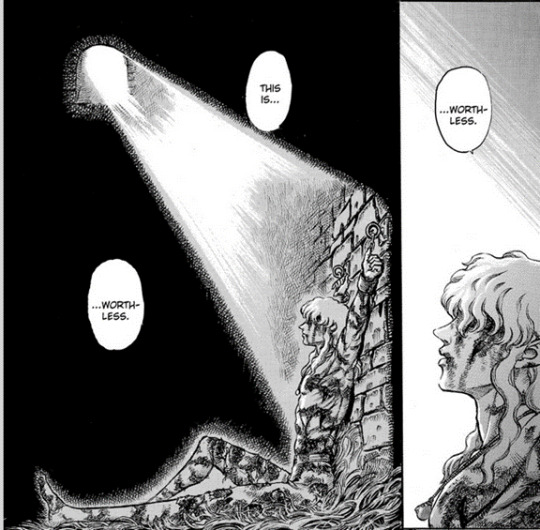
This scene shows us that Griffith’s self worth is intrinsically tied to his belief that he deserves to suffer, and this is set up as a vicious circle – the worse he feels, the worse he wants to make himself feel, and so on.
To back up a bit to the preceding scene with Charlotte, this is basically the gateway scene between Griffith as a functional human and Griffith as a self-destructing catastrophe.
Why he comes to Charlotte in this moment is open for debate – perhaps he’s simply trying to repress his pain over Guts’ leaving by attempting to seize the dream by seducing the princess. Or perhaps he secretly wants to get caught doing something risky that will fundamentally jeopardize the dream in order to punish himself for being unworthy of Guts’ love. Or perhaps it’s both at the same time.

Let’s quickly break down how this scene works in terms of Griffith’s state of mind. First we see him still trying to play the gentlemen, still repressing and putting on a show of the perfect prince for Charlotte. Soon after though, the mask drops and he basically reveals a hardened statue beneath. He’s ultimately too hurt in this moment to keep the cheeky and/or charming mask up – he looks like he feels cold and empty, and he’s still trying not to think about what’s just happened with Guts.
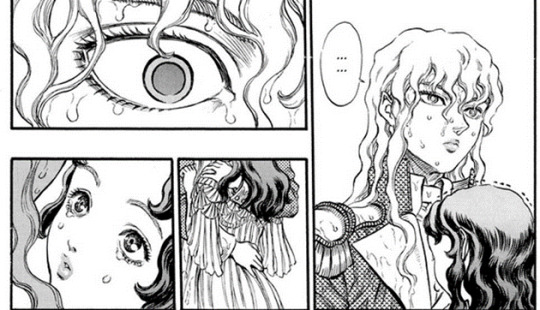
This is basically an exact midpoint between his repression and his self harm – he’s trying to smother the pain by not thinking about it (repression at its simplest), but at the same time what he’s choosing to do with Charlotte actually intensifies his pain, because it leads him to think about Guts anyway (self harm).

Again, Griffith’s repression exists to make himself feel better, to reassert the importance and value of the dream, and his actions don’t actually accomplish this in the slightest. It doesn’t make him feel better, because it’s functionally designed to make himself feel worse.
And yeah, we see that afterwards he clearly feels 1000% worse, not better.


Griffith’s self harm moves into the territory of self destruction here because he isn’t actually able to atone for anything by having sex with Charlotte – regardless of what he might have intended when he went to Charlotte’s room, the scene plays out to tear himself down, and the dream is no closer after he’s done so.
His isolation in that final panel is basically a visual representation of his own self-imposed punishment for his daring to think all of this was worth the price he, and more importantly everyone else, has paid for it.
In this way, this sequence and the one that follows in the torture chamber show us that Griffith’s change in attitude toward his acts of self harm v. self destruction comes down directly to the amount of self loathing he is experiencing, and in an intrinsically related way, how much value he places in himself, his own desire to feel better, and his ability to atone for his actions.
And I think it’s clear that things change for Griffith because of Guts. Whether he likes/recognizes it or not, by the time Guts leaves he’s also staked his self worth on what Guts thinks of him, because he loves him and craves his respect and admiration. Guts’ answer to “Do you think I’m cruel?” cuts deep, but not as deeply as being told that he essentially never had any of Guts’ love or respect in the first place, which is what he believes as Guts leaves (“Is this how badly you want to leave my grasp?” – see bthump’s excellent meta breaking this moment down in more detail).
It makes sense that this moment would deliver such a devastating blow to Griffith’s sense of worth that it makes his self loathing spiral out of control and leads to him tearing his life apart.
And indeed, I read something very similar going down in the guilt trip, when the Godhand essentially tell Griffith that not only did he never have Guts’ love, he was in fact never worthy of love in the first place, because he is evil, a monster, too cruel, dirty, and loathsome to deserve a way out of this hellish cycle he’s stuck in.
Redux: The Sacrifice as Self Destruction
As I broke down in my previous meta, my analysis of the Eclipse leads me to believe that during this sequence Griffith is choosing the sacrifice (self harm) and not the dream (repression).
Originally, I argued that repression played no part in the sacrifice. However, upon further reflection and lengthy discussion, I have come around to the idea that in fact it is still at play during the first half of the guilt trip. This is clearly the case, because Griffith actually does manage to make an “ends justify the means” argument with respect to his sacrifice of the BoTH, even confronted with an image of all those bodies laid at his feet.
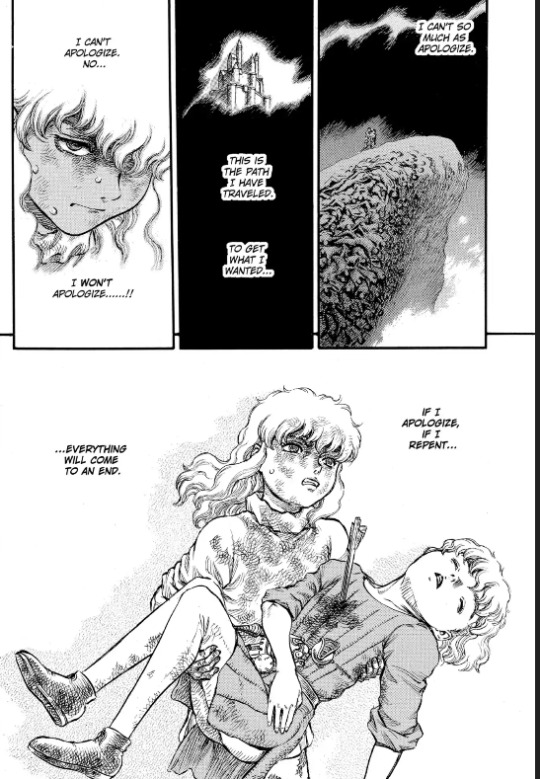
With the Godhand’s encouragement, he is temporarily able to push past the guilt to keep proceeding toward that end goal, covered in blood, in the attempt to convince himself that all this death and suffering couldn’t be for nothing (“If I repent...”). As I noted in my previous analysis, I believe this logic would have been enough for Griffith if all he had to do is sacrifice his Hawks – but as we know, in order to become a monster, you have to sacrifice what you love most, and imo no positive or constructive logic about finally attaining his dream could lead Griffith to the conclusion that the dream is worth anything close to Guts’ life.
It seems that what actually makes the difference at the bitter end is the intervention of fate and the word of God during the Eclipse. The Godhand essentially don’t let Griffith go through with this line of utilitarian thinking, because right after emerging from “the reality within his conscious realm,” they bring him right back into the pile of corpses, only this time it’s portrayed in less abstract terms by evoking the battlefield directly.
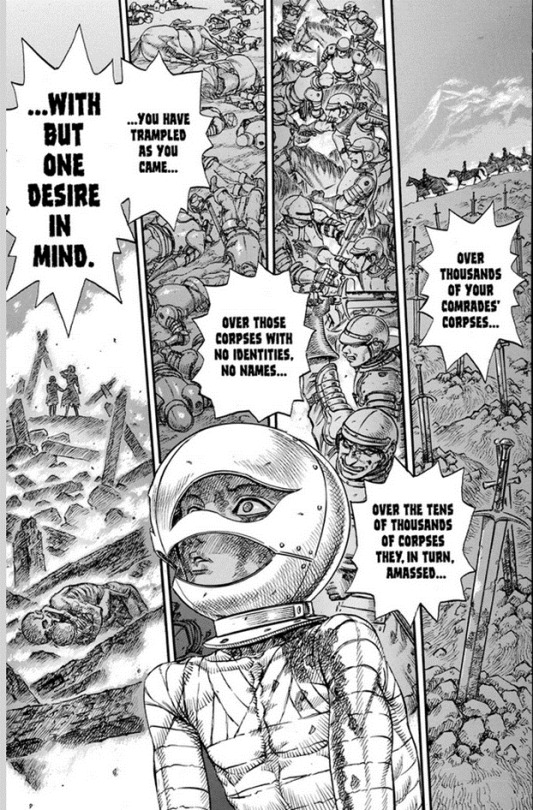
The Godhand are effectively telling him right after he’s successfully made his rationalizations that there’s no washing that blood off – that he’s already evil (“That is you”) and there is no absolution waiting for him, only his destiny, which is to reap the evil he has sown. It’s like they specifically get him to make the justification one more time in order to condemn him for it.
They prevent him from shifting the focus back onto that end goal and instead re-emphasize what he’s done to get there (“Over those corpses…you have trampled”), to tell him that he must embrace the cause and effect of his actions (“Bear [your] evil and confront destiny”).

In this way, it’s ultimately a pronouncement of guilt from the veritable mouth of god that finally puts the nail in the coffin of Griffith’s dance between the ends and the means, repression and self harm. They definitively come out and say that there’s no more repressing this, there’s no world in which this will ever be okay. You’re just evil and all you have to look forward to is more evil. This is you.
Directly after this, at the moment of the sacrifice, Griffith has basically been brought to his absolute lowest point, where self destruction seems like the only option (keep in mind that he’s already tried and failed to kill himself). After the guilt trip he thinks he’s less than worthless – he’s been convinced that he’s evil, and deserves nothing but more evil and his own eternal suffering, to “bear his evil and confront destiny.” This is where the last moments of his (human) life swing toward self destruction once and for all.
From what we’ve seen already about how Griffith acts when he feels worthless and wants to self harm, at this point Griffith cannot possibly think that he deserves to benefit or gain anything – not a castle, not absolution, love, or care or human connection. All he deserves is eternal pain and suffering. And by making the sacrifice, Griffith is guaranteeing that belief in his own mind, by obliterating all the remaining goodness within himself by committing an evil act.
Choosing those “raven-black wings” over the lives of Guts and the Hawks is so contrary to what values we already know he believes in, this moment it’s basically just more fuel for the fire.
Contrast the sentiment behind this:
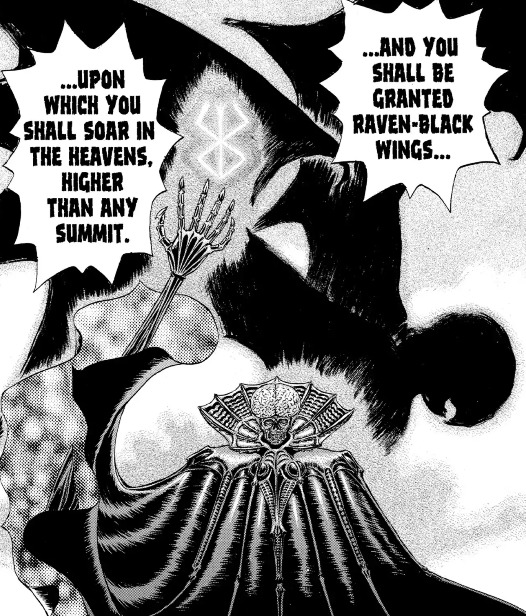
With this:

We’ve been shown that Griffith’s sense of ego is premised almost entirely on what he can do for others – he has left very little sense that he deserves anything for himself. That’s why the selfishness of the sacrifice is, imo, so personally destructive to him – because for someone who has such little sense of independent self or self worth, to make an entirely selfish choice is so contemptible, terrible, unforgivable in his mind that it completely destroys him.
We know that this same perceived selfishness is already his deepest source of guilt and trauma (the belief that he has put others in harm’s way for the sake of his own goals) – so agreeing to the sacrifice is a manifestation of that exact same guilt, just magnified a hundred times over. This act is him basically deciding to give up the pretense that any of his actions have ever been anything other than pure selfishness, cruelty, and evil, by fully embracing that evil and making an exchange for personal benefit, because in his mind there’s essentially no coming back from such a contemptible decision.
Griffith thus chooses the sacrifice as an act of self destruction, and it represents the choice to become exactly everything he always feared he was, to let go of his responsibility to do the right thing by proving that the Godhand (and Guts, or so he thinks) were right all along, by finally making a truly evil choice and thereby validating his belief that he has always been evil and therefore deserves to suffer for eternity.


This is what I mean by the sacrifice being an act of self harm and “spiritual” suicide, not just because he’s basically killing himself, but because the whole impetus is based around actively destroying all the things that he valued about himself – his own soul – everything that made him good and human in his own eyes (and like, this is exactly what Femto, the result of this choice, is). This decision is based around tearing his entire sense of humanity to shreds, by doing the worst thing to himself that he could possibly imagine (making an exchange for personal benefit and sacrificing his most dearly beloved) and becoming the embodiment of that cruel and violent world order he always hated.
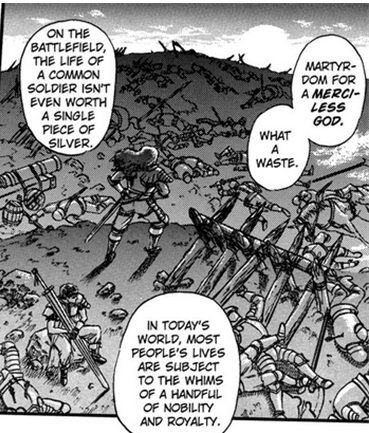
The way I think of this as suicide isn’t at all about making him feel better, because it’s not ultimately giving him absolution/justification for or abdication from his actions, it’s giving him the exact opposite – proof of his cruelty in the form of raven-black wings, which are basically just the evidence he’s been looking for all along that he deserves to suffer. It’s also not a depiction of true suicide, which would be an actual escape from his pain. Though this is still an escape in a way – not from his pain but into it.
Conclusions
While all the acts of self harm/destruction we see Griffith undertake throughout the Golden Age (the scratching, Gennon, Charlotte, the torture chamber, and the sacrifice) have varying elements of repression within them, because that’s still Griffith’s default response to his guilt, each are still ultimately acts of self harm/destruction because they result in tearing himself down and they actively function to make him feel worse – this is succumbing to the pain rather than trying to shield himself from it. None of these moments succeed at helping him along the path to the dream or making him feel better about himself, because none are functionally designed to.
And in saying this, I’m not also implying Griffith didn’t want his own suffering to end at different points in his life. I think after being tortured he wanted to die and end his suffering, after the soup-behelit/nightmare sequence he wanted to die and end his suffering, obviously, he attempts suicide after all. But the guilt trip is the ultimate difference in the end – the guilt trip is what convinces Griffith that he doesn’t deserve to end his suffering. That even his own “death” should be in the name of greater suffering.
Ultimately, what we can understand from this is that, despite the fact that he tries to pretend otherwise, when Griffith scratches himself it has nothing to do with attaining the dream, it’s not ultimately justifying anything other than his own belief that he deserves to suffer – he’s basically always just doing it to feel worse about himself.
When he has sex with Gennon, the specific act he chooses to take is one that is designed to hurt himself – there would have been many different ways to throw himself back into the dream in order to earn money without putting people at risk: for example he could have taken on some mercenary jobs personally, or sought out some non-combative work for interested Hawks – specifically why he chooses to have sex with a child predator is because he wants to punish himself for getting others killed, to atone through his own suffering. Choosing to have sex with a child predator as an act in isolation doesn’t advance the dream, only the end result (money) does. And that money could have been obtained in objectively less harmful and potentially more fruitful routes to that same goal.
Similarly, with Charlotte, his having sex with her, his leaving in broad daylight, his taunting the King, etc. – I read Griffith making those choices because some part of him wanted to destroy himself, to actively torpedo the dream because in some sense he has been brought to believe that he’s worthless and so is everything he’s staked his life on.
What he did in the river, with Charlotte, with the King, even the sacrifice – none of these events had to go down the way they did. The way they went down was basically arranged to destroy every one of those “sad and frightening things,” including the dream and his own life.
~~
In conclusion, I hope that this meta shows how centrally important the logic of Griffith’s self harm is to his actions throughout the narrative of the Golden Age. His beliefs about himself and his own suffering are shown to us to consistently shape his choices, and I think it’s also clear that this logic persists through Femto’s actions after the Golden Age.
I have some more metas planned where I’m thinking of fleshing some more stuff out that spawned out of my original meta and subsequent discussions around it, so keep out an eye for those if you’re interested.
As always, if you have any thoughts about any of this I would be very interested to hear from you.
Thank you so much for reading!
211 notes
·
View notes
Note
What do you think of Rowan, Ben, Penny and Merula's Patronus? Though I don't like Merula very much, I still think she is able to conjure one.
I’m putting it under the cut because it turned out a bit lengthy.
Rowan
I used to think of an Owl for Rowan because, y’know, it's “a symbol of wisdom” and all. But when I got this ask, I remembered that I found the site on Irish Astrology just days earlier – the same Rowling was using for birthdates and wand wood of the Golden Trio. Interestingly, each sign has assigned an animal there, and since the rowan tree is one of them, I decided to check it to find out that it’s a crane or a green dragon. A dragon makes me think of Charlie, but I did a little bit of digging on another option, and I have to say – I think I’m gonna stick with a Crane Patronus for Rowan.
This is what I found on the Crane symbolism:
Throughout Asia, the crane is considered as a bird of happiness and prosperity. The Japanese, Chinese, and Korean traditions relate it to longevity and fidelity.
Aristotle wrote about this bird that it always held a stone in its mouth so that if it fell asleep and the stone would fall down, the bird would wake. Thus crane symbolism came to be linked with vigilance.
I also checked Indian symbolism since Rowan is part Indian, and I found this:
[The Sarus crane] is also known as the eternal symbol of unconditional love and devotion and good fortune.
Interestingly, cranes are monogamous and they mate for life. That’s actually why in Japan, they’re often incorporated in wedding décor!
Overall, we have pretty positive symbolism. The parts about devotion and unconditional love sum Rowan up as a friend pretty well. We also have a part about vigilance which again is pretty fitting for Rowan who was probably the most aware from all of our friends that MC is indeed in constant danger – and that’s why they were suspicious of Ben (not because they simply didn’t like Ben – let’s remember that Rowan and Ben were friends at the end of a day).
Admittedly, “in some cultures, the meanings of crane birds can be negative: they represent deception, a harbinger of death, and even the symbol of the devil.” However, it’s actually a bit meta, considering all the people suspecting Rowan of being a traitor.

Ben
I really like the idea of a Lion Patronus for Ben. A Patronus form is not only about representing one’s personality, but also “the Patronus represents that which is hidden, unknown but necessary within the personality” - and it fits Ben’s bravery so nicely. I talk here mostly about Old Ben, but that’s also a pretty old idea of mine. I mean, Ben was always super brave when his friends needed it, he just couldn’t really accept it himself. I also find it kind of heart-warming to imagine Old Ben being intimidated by his own Patronus at first, only to become more and more comfortable around it with time.
Another thing, I remember reading once someone else’s point that it could be a funny reference to the Cowardly Lion from The Wizard of Oz – which, now that I think about it, Ben would be probably familiar with as a Muggleborn!
Now, as for New Ben… Well, honestly, I don’t think that Ben would be able to cast Patronus Charm at this very moment. He probably still feels too much guilt for Rowan’s death and whatnot. Still, I remembered a discussion I had with my friend after Rakepick’s Patronus was finally revealed, and she pointed out then that male lions tend to kill little cubs if they defeat a previous male lion and take over his pack. Y’know, to eliminate wrong genes. And you know what? It’s kind of what Ben did with his old self. Before the end of Y5, Ben had a pretty good understanding of bravery. There was that very sweet moment in the O.W.L.s TLSQ, for example:
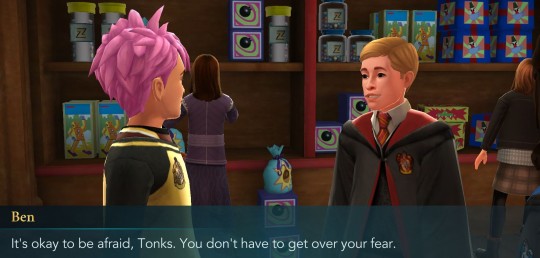

But then, the end of Y5 happened, and Ben was like: “Nope. I know no fear and THAT’S bravery”.
Either way, I do hope that Ben will eventually return on his path of a healthy balance between his old and new self, and I have a feeling that a Lion would still be a pretty good match then.

Penny
Probably an unpopular opinion, but I always thought that Penny’s Patronus should be some kind of a predator. I once even proposed a Black Panther, but I didn’t have a lot of reasoning behind it, to be honest. Now, I think I’m gonna change it anyway, and I’ll say that Penny would have a Fox Patronus. This is information I found on it:
The fox is a natural trickster, and brilliantly charismatic. Those with this Patronus are often more reserved, but do have the social capability to speak to just about anyone. They are strongly ambitious and observant of the behaviour of others, watching key points in what others do and storing them for further reference, when they may need them. They are good talkers, meaning they can convince people to do what they want and make them think it was their idea in the first place.
Foxes are quick, intelligent and strongly ambitious. Although they are known for their cunning nature, they are very charismatic and easy to love. If your Patronus is a fox, you have an ability to think outside of the box and act quickly during emergency situations.
Penny is insanely ambitious about her Potions-making. She said on more than one occasion that she couldn’t pass the opportunity to brew more advanced Potion. She’s also obviously charismatic, and the part I might like the most is about “making others do what they want and even make them think it was their idea”. Because when you really think about it… it’s exactly Penny.
Like, making MC steal the ingredients for the Forgetfulness Potion and very similar situation again with the Draught of Peace (each time not even telling MC what it’s about until the very end). Making MC impersonate a Professor or a Prefect. All those situations could get us in pretty serious trouble. Yet, the best example in all of that is the Animagus TLSQ, in my opinion.
The quest started with the rumours that Talbott is planning to become an Animagus, and so MC got intrigued and decided to help Talbott get ingredients, hoping that Penny could make an extra Potion for them. But then, it turned out that Penny doesn’t make the Potion for Talbott at all, and she wanted MC to take it instead. Moreover, Talbott was already an Animagus, so the whole story didn’t really make much sense from the very beginning. Now, it might be the case of Jam City screwing up badly in writing, but it doesn’t change the fact that this is basically what happened: Penny wanted to brew the Animagus Potion, so she sent Talbott to get MC intrigued in the whole thing, so MC thought it was their idea while Penny could brew her Potion. Now, tell me she’s not a Fox – especially that again it could’ve been pretty dangerous for MC if anything went wrong.
There’s also a part about thinking outside of the box and acting quickly during the emergency, and funnily enough, it’s also kind of true for Penny. The thing is that she doesn’t act well in those situations – but that’s a separate problem.
Also, I don’t know if you can tell it by now, but I totally believe that Penny should’ve been a Slytherin, and I will die on that hill. Just a digression.

Merula
Hm, how about a Mole? Or a Rat? :D Just kidding, of course. Mostly…
Seriously though, I had a bit of a problem with Merula. I thought of a Skunk or a Frilled-neck lizard at first, y’know, because they try to look more threatening as a self-defence mechanism. I considered a Yorkshire Terrier as well because they’re always yapping at bigger dogs. And while they kind of fit Merula, they’re definitely not perfect matches. Merula has no dog qualities whatsoever, and even though her aggression is probably caused by a lot of insecurities, skunks and frilled-neck lizards don’t really harm whatever threatens them. Merula does harm, whether physically or emotionally, and she’s pretty calculated in that.
So, I kept thinking about something else, and there was one option I was coming back to. And even though I didn’t fully like it at first, I think I’ll stick to it, and I’ll say that Merula would have a Black Mamba Patronus.
Here’s some information about Black Mambas:
Cloaked in the color of death and measuring over 14 feet in length, the Black Mamba is regarded as one of the most vicious snakes in the world. It’s also one of the most venomous. (…) Unlike many animals, which simply have an anger problem, Black Mambas are driven by an extreme form of fear-based aggression. Being exceedingly nervous, the slightest sense that the snake’s escape route is compromised may unleash an attack of unparalleled ferocity.
There’s also an interesting quote from the discussion on whether or not they chase humans:
No, they absolutely don’t chase humans. No snakes chase humans. However black mambas are so high-strung they’re practically hysterical the moment something makes them nervous, and they’re really not very intelligent. As a result, these snakes are extremely prone to absolute panic. If you corner a mamba, its fight/flight reflex is triggered, and it will freak out and try to fight you to escape. This involves wildly throwing itself around and biting you like 60 times in a row, if you don’t get the blazes out of the way. (…) And they’re not very good at evaluating the level of danger they’re in. Or… much of anything.
… and that’s basically Merula. She’s in a constant state of panic that people are better than her. Especially in earlier years, she constantly felt threatened by MC’s mere existence, even when MC was clear they just don’t care about her – so she was attacking. All. The. Freaking. Time.
Moreover, snakes in general are often associated with deceit, so there’s that.
Of course, there’s also much more positive symbolism around snakes, like a rebirth, transformation, or heling. And while I have no doubts that Jam City won’t give Merula a proper redemption arc (because they're too lazy about it), she clearly is a character who’s supposed to be all about redemption. So, I guess that’s another reason why a Black Mamba would fit nicely, even though it seems a bit stereotypical for a Slytherin (then again, Merula totally should’ve been a Gryffindor, but that’s a topic for a different discussion).

#long post#hogwarts mystery#hphm#rowan khanna#ben copper#penny haywood#merula snyde#patronus#about characters#ask#anonymous
46 notes
·
View notes
Note
hi, what are your thoughts on the season finale? im.. processing
hi, i have MANY thoughts and i'll try my best to articulate them (under the cut, because i know there are still a lot of people who haven't seen the episode yet)
spoilers below!
so overall i actually really, really loved it. idk if that's a hot take because i have seen a fair amount of people who have disliked the finale and the season as a whole, and while i respect those opinions i personally disagree on both counts. i have some problems with the season, but i still enjoy it more than season 1 and this finale was, in my opinion, incredible and really makes me like the season overall much more as a result.
of course people are upset that nat died, but imo they're using their love for nat as a character to support their claims that nat's death was sloppy writing or unnecessary. don't get me wrong, i love nat in both timelines and was devastated by her death in the present day, but i can also understand that it was what makes most sense for the story and it's a narratively satisying choice for both the character and the plot. people in fandom are really against killing off characters, even if their death makes sense and is emotionally effective, and while i do get the attachment to a character, it really annoys me that people can't overlook that attachment when a character's death is rich and complex and adds to a story. both things can be true; you can love a character and think that their demise within the story is a necessary conclusion to their arc. i was worried that nat would die and, as i said in the last ask, i was wary about its execution. but imo the writer's nailed it and seeing it play out on screen changed my perspective. i'll miss juliette lewis so much though, she was truly wonderful as adult natalie :(
nat being antler queen was also a really well executed twist; so much of what we've thought to be true in the series has been changed fundamentally by it (the entire pilot episode is filled with hints that nat is antler queen if you go back and rewatch it! my mind is blown). i disagree with people claiming that the writers are retconning or making things up as they go, there are so many hints throughout the series that worked towards the nat reveals in both the past and present, both of which are narratively rich and compelling developments that make me even more excited for the next season.
beyond that, the cabin burning down was something i had predicted weeks ago, so it was cool to see that i was right! ben's days are numbered for sure though, he's gonna die in like episode 1 of season 3 🫡 van's character arc in both timelines was also really interesting; lauren and liv are AMAZING and i cannot wait to see more of both of them (same for simone and courtney as lottie, they're both phenomenal). seeing how the shauna/nat rivalry (really a one sided rivalry on shauna's part jkdvdkfvkfd) plays out in the 96 timeline next season is also gonna be really fun to watch.
we're still in the dark regarding who javi's friend was (i kinda thought that would get revealed in the finale, but ig it's being saved for next season), and jason ritter allegedly filmed scenes as cabin guy that ended up not being in the finale after all, so i'm really curious if that will also be saved for next season (but i'm still on the bonus episode clown train 🤡). the dark tai stuff was similarly discarded in this episode and i'm really intrigued by where that goes.
tldr; great episode, really rich and ultimately satisfying, i find myself liking it the more i've sat with it, and it changes so much of what we've seen so far while also setting up what's sure to be a really intense and dark third season.
#these are just general thoughts but if there's something you'd like me to specifically touch on lmk!#i had mild expectations going in so i'm really pleased with it#thought it was amazing and i tend to be more reserved with season finales. but this was just really strong for me.#💌 answered 💌#yellowjackets spoilers
4 notes
·
View notes
Note
Back again lol. Even though the writing just hasn’t been the best this season, I’m not really that mad about the way they’ve portrayed Jeresa. Just looking at this logically, I feel that they gave us 5x02 as our Jeresa episode early on and there really was a lot of sweet moments. Now, inevitably we had to have angst in between. But it’s been constantly cemented that James is in love with Teresa, and strongly implied that she loves him too. They can’t just build that up and leave it unresolved. Plus, with TV shows in general, a couple being together early on in the series just leaves it open for unnecessary conflict and the ship just loses its intrigue. If they give us the Jeresa ending we’re hoping for then it makes sense to have not got them together any episode earlier than the final 2. And despite everything, I think the writers have been a hell of a lot better than others in keeping their ship alive and not causing a irredeemable issue between them. I probably shouldn’t defend them before seeing the next two episodes, but I am hopeful. All that being said, there most definitely should have been more scenes and dialogue between them. We should’ve had a Tony moment between them (I’m so mad about this, especially since the writers acted like it was such a pivotal part of the season and then only showed Pote’s ‘grief’). I’m very sorry for rambling, just wanted to hear your take.
Oh, yes hello, back again, I see. Your ask made me sigh because I think it opens me up to be honest and critical of this season’s writing, and that kind of opinion may not always be favored around here, and also because it requires a response of essay length. But I’ll do it for you, anon, I will. Okay. So you want my take on the portrayal of Jeresa in season 5. Here we go. After the jump:
Let me preempt this by saying the show isn’t too serious (try and tell me this is still a serious show after the kerfuffle that season 5 has been), so you shouldn’t take this too seriously either. I have an opinion but I’m just…me. I encourage everyone to stick to their guns about what they feel about QOTS; what you like about it, what you love about it, what gets you excited, what you think has been done well, what is worthy of praise, etc. etc. etc. I go in pretty hard on the show in the next several (LOL, yes, really) paragraphs. But I am in no way the ultimate authority on all things QOTS.
I don’t think Jeresa would have unnecessary conflict and I don’t think the good ship Jeresa would lose its intrigue. In lieu of conflict, we’ve gotten…*crickets* nothing. No conversations of real value, no meaningful exchange of ideas, no arguments, nothing. If anything, the conflict between Teresa and James that is necessary had been absent. In seasons 1-3, there were always disagreements between Teresa and James. There was never a point reached where it created too much conflict, or unnecessary conflict. It created tension, which is like the very essence of Jeresa, and it showed the dynamic they have that made so many of us fall hard for Jeresa as our ship, as our OTP. I don’t think making them a couple or having them together early on in the season would create unnecessary conflict. I think it could’ve created different conflict than what we’ve seen before, and wouldn’t that be a beautiful thing, to have seen them evolve and deal with each other in ways we haven’t seen before?
So, related to what I said about different conflict, as far as intrigue goes…I don’t think presenting Jeresa as a couple or in a relationship would ever make them flat or boring. When I think back to season 3, when we got Jeresa in 3x05 and 3x09, I wish we’d been offered the chance to see them succeed and see what happened with them if they tried. Like I said, it’d be a different kind of conflict, a different kind of challenge for them to face and have to face together. That sounds so opposite of lacking intrigue to me, anon. That’s a side of Jeresa I would have loved to see.
You’ve pointed out that, in general, on TV shows, getting a couple together too early usually means doom and gloom and failure for them. One of my favorite shows ever was Veronica Mars, the first two seasons especially. When the showrunner, Rob Thomas, has talked about the first kiss Logan and Veronica have, he refers to it as being earned. For QOTS, and for Jeresa, I really felt that when they shared their first kiss in 3x05. It took so much and they went through so much to get to that moment. It was earned. So, with that idea—of the earned kiss, of the earned get together, of the earned relationship—in mind, to me, there is no point in season 5 that would have been too early for Jeresa.
Talking about TV shows and how they usually go in general leads me to my next point: as a viewer, is that what I want and is that what I should expect, to be given more of what’s typical? Maybe the writers and critics and people much smarter than me will tell me it’s my fault, I’m the fool, for wanting to critically engage in media that’s not meant to be consumed that way. Maybe I’m just supposed to accept and enjoy and be happy with what I’m given. No one claimed this wasn’t going to be typical. So okay. It’s on me. It’s my bad. But here’s the thing. If I’m supposed to accept and enjoy and love this as it is…well, give me something to love. I’m not asking for a revolution or anything life-changing here, just something I can appreciate (and this season, in my opinion, has really lacked things that I can hold on to and appreciate). So as for typical TV…I’m not down with merely accepting that because things usually go a certain way, that’s how they always have to go.
Why do Jeresa have to fail if they got together earlier in the season? Why is it so out of the realm of possibility that they might succeed together? Are they so emotionally stunted, do they lack so much compassion and understanding of each other that it would be impossible for them to listen and move forward together? What if they could discuss their issues, tell each other how they feel, stop hiding, and try? Who says there wouldn’t be angst and tension between them as they try to work through their issues? What if they’re actually supposed to be together and it would make them stronger—individually and as a couple?
Now, forget everything I just said. LOL. Let’s say we have to go by TV in general and typical TV rules. Let’s assume if Jeresa got together early on, then we’d see them struggle and fall apart and break up. Fine. Okay.
Here’s how Jeresa could have played out after the first two episodes:
5x03 banging honeymoon phase, probably
5x04 arguments and frustration with each other as T embraces being the white queen
5x05 J finds out about T’s coke usage and has to walk away from the relationship because he can’t stand to be complicit and stand idly by while she destroys herself
5x06 classic Jeresa angst and tension
5x07 KG’s death leads to T’s breaking point and J is there to support her
5x08 honesty hour, where it’s made clear that these two mean so much to one another and they’re running out of time to let each other know that, so they tell each other
5x09 one last united mission + they hatch the plan to get out and be free + a farewell with the promise and intent to see each other in another life
5x10 reunion in another life
Are these all headcanons? Of course they’re headcanons. Of course I would never expect the show to go exactly how I thought it would or with my own ideas. My point is that if they would’ve gotten together early on and we’d been given a glimpse of what that would be like, even if they failed, it doesn’t mean it would’ve been impossible for them to ever find themselves together again before season’s end.
“There’s not enough time,” the writers said. “It’s an action packed season,” the writers said. Okay. Why? There was enough time to spend on backstory of minor insignificant characters. There was enough time to introduce characters, tell us a bit about them, only to see them dead by the end of the episode. There was enough time to focus on Kote’s story, over multiple episodes, with not just a baby plot but a kidnapping one as well. So why? Why was there no time for Jeresa? Forget about them getting together and kissing and sex. If that was what it was (and it was) they wanted us to not have, then fine. Some of my favorite Jeresa moments were in the first two seasons, when Jeresa getting together was very much not a thing, when tension was high. So if it was just the portrayal of them not being together, if we still got the scenes of tension and them having no choice but to communicate, that would be completely fine. Like I said, I know I’m never going to get exactly what I want, my headcanons are mine, so that’s okay. Oh. But…no. Oh no. There was not even enough time for Jeresa to have more than short, throwaway, blink-and-you’ll-miss it conversations? Well. It’s the writers’ decision. They wanted it that way.
“It’s a Teresa-centric season,” Dailyn claimed. Like I’ve said before, James is a big part of Teresa’s journey and story. If you’re going to have a Teresa-centric season, it’s hard to accomplish that without shedding more light on James and Jeresa. This isn’t a Teresa-centric season. This has become the Kote show. Teresa is the main character but her journey has been pushed aside, diminished, and downplayed in order to make way for Kote ultrasounds and Pote grunting and Kelly Anne thinking “positive” and hopeful that Marcel will come to a party at the safe house. Instead of getting conversations that would offer insight into Teresa’s relationships with those in her family, we got an extended deep dive into the most chemistry-lacking relationship we’ve ever seen on the show. Well. It’s the writers’ decision. They wanted it that way.
“It’s Queen of the South, not Jeresa of the South,” the writers will insist. If by that they mean it’s Kote of the South. Imagine for a second that it actually was a Teresa-centric season but they were adamant about keeping James in this minor capacity. Okay. It would still be different than it is now because we’d be in tune with Teresa. We would’ve gotten a glimpse into her thought process. Was this not, at some point, meant to be a story about a strong woman? I can even extend that question to Kelly Anne. Was this not, at some point, meant to be a story about strong women? Then why do we keep seeing them make asinine decisions? Why are their most extreme actions in reaction to what the men have done?
Moreover, if this show is about the people in the cartel, in Teresa’s inner circle, rather than just the Kote side plot becoming the main plot, there’s no way this is the James we would be getting. James, our beloved reluctant assassin…who we know nothing about. He can’t even get a backstory on a show on which he is supposedly one of the main characters. Five minutes—five seconds—couldn’t even be spared on James and how he came to be who he is, how he got where he is. But Isidro Navarro? By all means, I need to hear his life story. Who’s Isidro Navarro, you ask? Right. Exactly. Apparently we don’t deserve backstory and explanation and conversation and introspection from our protagonists. But a character who is there for ten minutes or less on a single episode and will never be heard from again in any significant manner? Of course he needs his screen time. Well. It’s the writers’ decision. They wanted it that way.
“This is not a romance show,” the makers of season 5 said. Honestly? Fuck that noise. Fuck that sentiment. Fuck that ignorance. When has Jeresa ever been about romance? Where do the people who make this show get off saying something like that as if we are so stupid we don’t know that? A romance story and a love story are not the same thing. Jeresa is love. God forbid Jeresa ever experience love within a successful relationship. God forbid Teresa and James ever become mature enough to use love as strength rather than weakness. But pile on all the Kote. Focus on them and emphasize how Teresa and James can barely even look at each other. Well. It’s the writers’ decision. They wanted it that way.
So now here we are, on the cusp of 5x09. We got a spoiler in the last promo trailer. We know, after 7 episodes since their last conversation that actually meant something, after the writers missed the mark and didn’t have Jeresa interact in a way that was significant and necessary over the course of the season, that there is at least one kiss. They might even have a conversation. They might even share more than one kiss that leads to more (but also, don’t be surprised if we get a mere few seconds of a kiss and nothing more before fade to black). This is going to make us so happy because finally, finally, they’re giving us what we wanted. And then what? What does it mean if those things are true? Is everything forgiven? Is the instant gratification of seeing our ship sail for a scene or two enough? Does it make up for the character assassination of the characters we love? If we somehow get the ending we want, or at least one close to it, is it even believable anymore? Is what has been broken all season so easily fixed?
Listen, I already know the counter argument. I’m going to be told I’m crazy, that Teresa has to be on her own, that it wouldn’t be interesting, that it would diminish the payoff for Teresa and Jeresa in the end. I get it. Typical TV rules, right? We have to go with what people know, what they’re used to. But what have we gotten, really, to preserve these ‘rules’ for TV in general? Teresa has been dumbed down and is now lacking a lot of the intuition and street smarts she had before. She makes bad decision after bad decision and she doesn’t see what’s coming. The actions she takes are in reaction to those bad decisions. James hates so much of what he’s been made to do but for some reason he keeps going along and carrying out Teresa’s orders; he’ll just stew over it quietly in a corner without saying anything. Teresa and James don’t talk to each other, at least not about anything important, and when they do talk, they give each other heart eyes but never scratch the surface—how could they when they talk for like 10 seconds at a time? So. Has this been a good portrayal of Jeresa? You tell me. If it’s fine with everyone else, then I guess it’s fine. I’m probably the wrong person to ask.
#answered#qots#queen of the south#teresa mendoza#james valdez#jeresa#i have opinions they are unpopular#unfollow me block me do what you gotta do#queen of the south season 5
43 notes
·
View notes
Text
LoV Colour Analysis Part I: Shigaraki Tomura.
As this analysis would be quite too long to read in one go, I decided to split it into three parts, each covering one of the Three Main Villains of BNHA (Shigaraki Tomura, Himiko Toga and Dabi).
All three do denote a precise and powerful colour scheme, but on today’s episode I am going to focus on the Leader of the League of Villains aka Shigaraki Tomura or Shimura Tenko.
Shigaraki’s colour pattern variates from Red (shoes and eyes), Black (his usual outfits, his hair when younger) to Light Blue, Grey and White (colour of his hair, skin and hands).
The interesting fact is how Shimura’s colour evolve with his persona and Quirk. The third paragraph is dedicated to the colour Yellow, which is not part of the palette associated with Tenko, but I included it because it adds to the detailing of Shigaraki’s character.
(Spoilers ahead! & tw/: mentions of canon-compliant violence; death)
I.) From Black to Light Blue to White
During his growth, evolution as a villain and person, not considering the one spurred from his Quirk, Tenko’s hair undergo a quite big development. While the colour of his clothes stays more or less stable (being black throughout the entire series), what differentiates his eras is the colour of his hair. In his childhood, before manifesting his Quirk, Tomura’s hair was dark (strikingly similar to the one both Touya and Izuku sported). This changed to light blue/grey in his years until last arc, where after being himself an experiment under the hands of Doctor Death (Kyudai Garaki is a very creepy man) to inherit the original AfO’s Quirk, his hair becomes snow white (as a result of the transformation, I would believe - but it might as well mean another thing which I will talk about later).
Beginning with maybe the easiest association: the colour black.
A little note of the fear association: in this case, I would like to interpret it as Shigaraki being aware of his decaying Quirk and freak people out because of that, and because of his external looks, which do look like the one of a decaying child.
Power refers definitely to both his position and his Quirk, in this case - which make him stand out even more. However, the strength in this case, in my opinion, is more a smoke screen: black is also worn as a protection from external damage, as in stress and emotional backlash. This creates a barrier between the subject and the world, protecting internal emotions, and hiding its vulnerabilities, insecurities and lack of self confidence. The emotional trauma, the ‘hands shield’ Shigaraki derived, in a way, from his trauma and from being confronted with something, has shaken him to the core since childhood, and in this case the clothes serve to protect him from himself and his ‘actions’. In this aspect, him wearing black as a child might also stand for him trying to shield himself away from his parent’s judgement and stare, while protecting his will to want to be a hero, despite their negative reaction to any hint of that. These meaning are, in conclusion a full circle: one calls for the other, especially in Shigaraki’s case.
Black is also associated with mystery, evil and aggression. Shigaraki is written as an enigmatic villain, cold-hearted, devoid of any humanity and the will to full front destroy everything in its path. And while the meaning perfectly fit to how Shigaraki should be, I do believe that this is a very superficial and banal description of such a complex character.
One thing which I found particularly interesting about this colour and its relation to Shigaraki, it’s the rocky tie that appears between black and its meaning as in rebellion. This aspect might refer to two different conditions: it might suppose a certain degree of refusal and hate for authority (The society at large), and at the same time the rebellion from his own family/persona/mentor, which could entail a fundamental foreshadow for Tenko’s destiny.
The color black affects the mind and body by producing feelings of emptiness, gloom, or sadness.
I think here again, this might just an extermination of the feeling that have been torturing Shigaraki from the inside since he was a child, and that he himself has not acknowledged, which also stands to explain how he tries to feel that void or to ‘eliminate the scratch’ that has been tormenting him, and that knows no peace.

Furthermore, In Japanese culture, the colour black mainly denotes non-being (apart from mourning) and evil-heartedness in a person. This meaning is consistent with the personality described to us by Horikoshi: Shigaraki Tomura ceases to be a person at one point, when his consciousness gets subdued by AfO for a while. It is important to note here, how White (on the other side of the spectrum) is also the colour of death and mourning.
Not entirely worth mentioning, is that black is the stereotypical colour worn by villains and bad guys in different fictional environments.
(Light) Blue/Grey.
Just a reminder: neither grey nor blue are explicit colour in Tenko’s palette as a character, but I think they are still important and since greyish blue (the precise colour oh his hair) has not its own meaning, I took the freedom to actually associate the two separate colour in association to describe this period of transition between black and white.
The phase in which Tomura has Greyish-Blue hair is the longest one (in terms of years), but also the phase of passage (which consequently is the phase he is exploring, and is in the ‘grey zone’, where things are just getting defined and there are no absolutes). Grey, in this sense, sports both characteristics from White and Black (depending on the shade used), and even if not explicitly used for Tenko, it still represents a landmine in his development.
The colour grey is an ‘unemotional’ colour. It is detached, neutral, impartial and indecisive - all traits that can be reconnected at Shigaraki. Indeed, it is after his encounter with Izuku at the mall where he recognises why exactly (or so he thinks) he rages and wants to bring destruction to the world as known. This indicates how he has been striving for a real purpose, like the one Stain has, in order to actually understand what he is doing and evolve from the child the Heroes define him as, to a Villain with the capital V. He does relate to reality in partial ways, while he tries to define his identity as something that has died inside of him, Shimura Tenko, and at the same time the part that has lived on through the memories he removed and the hands which accompany him. He does not know which part is stronger, and trying to figure it out he tries and fails, only to try again. To confirm the shaping of Shigaraki, indeed grey is a conforming colour and most of all it struggles with identity, which is arguably the most prominent trait Shigaraki presents during the first arcs of the story.
On the other hand, Blue symbolises coolness, passivity, fidelity. Somehow it reverberates the meaning of grey, while at the same time enhancing its other effects (it being emotionless and calm, undecided but also flowing). Blue is also indicator of depth, wisdom, confidence, and intelligence (among others). This also confirms the precedent meanings (of especially white) and it adds another dimension to Tenko’s character. It is clear how he feels deeply, and is still very clever in its own way. Still, this development and phase serves for him to obtain the other characteristics proposed by blue, especially wisdom and confidence (refer to Black where I said how sometimes the clothes are a screen to hide his true feelings).
Blue is a colour that’s constant and unchanging, which contrasts with grey and brings forwconstant struggle in Tenko. Blue is also nostalgic. Curious is how blue lives in the past, relating everything in the present and the future to experiences in the past. I think that this is what blue is about with Tenko: he struggles to look forward, to forgive and let go because he never forgot his dad, his grandma or even society for when they had brought upon him as an innocent child. His bringing up has been focused, after all, on his developing his constant feeling of sadness, rage and gloom and the necessary power to express them in confident ways, which could bring destruction forward. Tenko is a puppet in AfO’s hands since he has ‘saved’ him, so I think this is why the sentence in which Shigaraki tries to break free from AfO’s will is a break point for the story, and for Shigaraki as well.
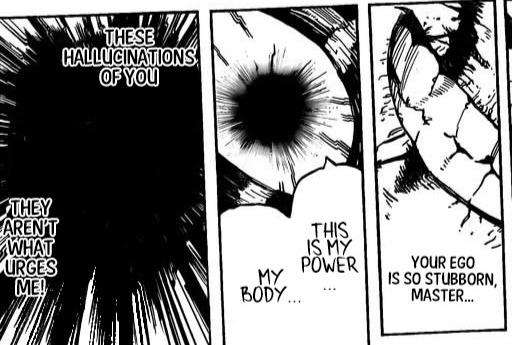
Blue is also known for being deceitful and spiteful, depressed and sad, passive, self-righteous, emotionally unstable, weak, unforgiving. It can also indicate manipulation, unfaithfulness and being untrustworthy.
Indeed, it is after that Izuku sees Tenko being kneeled over by AfO and his presence that he understands that Shigaraki too, is human and that maybe the reasons for his rage and absolute hate for everything he comes across have deep roots, which is why even if he cannot forgive him for all the pain he has brought, he wants to save him.

Finally, the paler the blue the more freedom we feel - which brings me to my theory on what, throughout the years Tenko’s hair have been ‘decaying’ and bleaching out. I think that as a child, Tenko is caged and tries to break free of his cage, of his ‘itch’ but he cannot because he does not realise what it is, and there is no freedom for him to actually understand. The first time he uses his Quirk, he feels finally satisfied for the first time. He tasted freedom for the first time, and now he wants to do it again and again. Growing up, however his ideals become blurry and he does not understand what he actually wants. He does know that the hands on his body represent what he has lost and what is actually still there with him, giving him strength and will, but at the same time he does not know what is beyond there. Which is why, after he goes through the transformation by Garaki, his hair becomes white: he gets rid of the insecurities, of the shackles that have stopped him from actually achieving his goal, or rather to pursue it freely. His ultimate goal, after all, is to get rid of his ‘itch’, which, in its own way, it’s his language to say that Shimura Tenko wants freedom.
As a note, Blue is also the colour of the Throat chakra. It is located in the throat, but it is linked to the throat, neck, hands, and arms. This Chakra is linked to speech.
Final remark on blue: this colour is one of the most important lucky colors in Japan ( together with yellow, white, purple, green and, red) - and all the colour associated with Tomura, except for black, is indeed considered lucky.
White
White, is an inherently positive colour, is usually associated with purity, innocence, light, goodness, beginnings, possibility and perfection. However it is also described an dperceived as cold, impersonal and bland. Shigaraki after his ‘transformation’ is the perfect soldier: he is very powerful, to a fault, and represents a new chapter in not only his own life but as well in the one which has been conducted by AfO, as he sees him as his vessel. The fact is that the beginning of a new Shigaraki which is flawless, in appearance, is a very well constructed lie. While he should represent perfection, first of all his transformation has not been entirely completed and furthermore, while it does represent a clean slate in his check, is also the possibility, reality coming through for AfO to take advantage of the body new, which Tomura must preserve. As the new Shigaraki however, has his ideals very present and wants to fight for them, to protect his feelings and his ideas, it is anyway a struggle for both him and AfO to juggle through everything going on Tenko’s mind, and emerge victorious. This is also the most interesting aspect of this colour: the goodness and inherent purity which comes from this colour implies a purification process in Shigaraki’s character, who instead gets fixed even more on him not wanting to forgive society and insisting on going on his rampage, because at the same time he cannot let go of these feelings, because now they are the only thing which make him go forward.
White is usually used in contrast to black, and represents the dichotomy of good and bad.
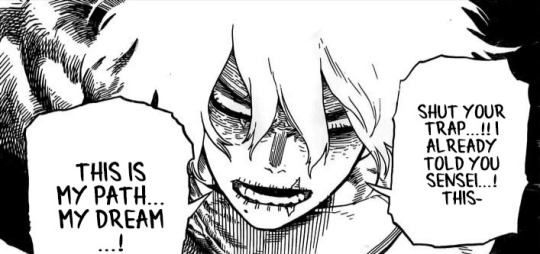

The psychological meaning of white is wholeness and completion. This also refers to the meaning and falls into the category of ‘perfection’: it is a new beginning, but at the same time it represents the closure of a cycle and the beginning of a new one: a perfect one, which represents closure (‘The Circle’). Tomura is supposed to be the new complete weapon at AfO’s will, but as I states before this is a fought point (between the two of them).
White, in cultures that believe in reincarnation is held in high regard. Indeed, they sustain how white is a sign of rebirth.
Technically, Shigaraki has been reborn. What I mean is that he has transformed himself into not a new person, but in a better version of himself, he upgraded - and now of course going back is not an option. He has been held in a womb, breeding his new potential and now he became an individual whose strength far surpasses normal, his quirk control is absolutely insane and as well his memories, ideas and feelings are heightened. The theme of rebirth, which I think fits both Shigaraki and Dabi, is used a few times in BNHA, but as for Shigaraki it is very literal and very clear (after all he has been asleep for a time, just to wake up and fight an entire war against the Heroes). It is clear however, how his personality has been rebirth too: while he was not insecure, but more hesitant, now he is sure of his objective and he thrives on achieving it. What distinguishes therefore the old Shigaraki from this new one is the knowledge of being powerful and therefore being able to accomplish what we wants.
Finally, white inherently denotes death and mourning too in the Japanese culture, as well as black. Here, we are mourning the old Shigaraki, and the loss of the traits that instead made him a little bit more human, and a little less like God himself.

II.) From Red Eyes to Red Shoes (in association with both Izuku and Katsuki)
I already talked about the colour red in regard to Izuku here, but if we take the same meaning and apply it to Tomura instead, we get a different picture. It is no mystery how Izuku and Tenko are foils for each other, and that they resemble each other in different ways (starting from them sporting red shoes, to their characters, being ‘accepted’ and trained by a mentor, and so on).
Red is the colour of extremes. It appears clear how Izuku and Tenko represent the opposite extremes: where Izuku is enamoured of heroes and idolised them to an unhealthy point, even though he comes from a background where he has been discriminated by that same society because he was different, Tenko is disillusioned with the society they live in. He wants to destroy to the ground, because he cannot find it in himself to forgive anyone who could and did not extend him a hand when he needed it. At the same time, both Izuku and Tenko believe that to a certain extent what they had done has been ‘deserved’, and are not entirely focused on their own well being.
Red is also an attention-bringer. As I already noticed for Izuku, it is very curious how both wear red shoes, as a way to try and separate themselves from the rest, trying to escape the opinions of other which have labelled them in a way, and of course at the same time trying to take control and wanting to be the best in their own ways (hero or villain, that is).
Red is also the colour of blood, of rage, anger as well as desire, leadership and strength. I want to make a point which I do not know whether is important or not, however, a fact that struck me hard is how Shigaraki’s irises are very very small, and it somehow seems that he tries to compensate the little quantity of red of Shigaraki with wearing red shoes. This might be an indicator how Shigaraki strives to achieve these qualities, but at the same time he needs to put a lot of effort in it, and furthermore it somehow feels different from when we compare it to Izuku: even if both are charismatic leaders, Shigaraki is very dispassionate about it, while Izuku frequently denies how his influence might be fundamental when it comes to other people (Katsuki, All Might, 1A). However, Shigaraki does reflect in his personality, the venous desire to be angry, aggressive and destructive as it what his power entails, and after all what has been taught to him. I noticed as well a post (which unfortunately I cannot find) where it says that Shigaraki has a very high tolerance pain (again, the parallels with Izuku are insane), which also reconnects somehow to the colour red as we saw how Shigaraki himself even if tired (LoV vs Machia/LF) or absolutely bloody and at the brink of death is instead held up by his will to destroy (Shigaraki vs Heroes).
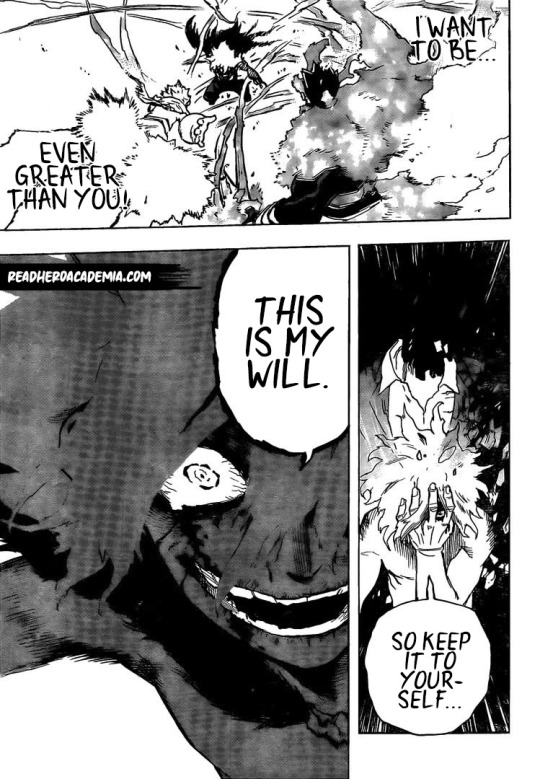
It relates to danger, power, determination and action. Well, Shigaraki and danger go to hand in hand as well as determination and action. After all, Shigaraki’s Modus Operandi is Trial and Error, which means he is not afraid to be wrong and to try things out, even if he is stubborn and ways things to go his way, every time (when that rarely happens in general).
Red is indeed determined, powerful, impulsive and aggressive. It is also tied to self-preservation. Although true for the most part, the self-preservation is still a massive blank point.
He is bloody, and even AfO is telling him to rest and preserve his energies (even if here, my counter argument would be that it would be easier for him to overtake Shigaraki’s body if he is weaker, so I do not know how reliable this is).

The color red in Japanese culture denotes strength, passion, self sacrifice and blood. It Also stands for good luck and happiness. Which is still very amusing to me, as Shigaraki feels like the farthest character away from achieving happiness, and his passions and strives are all useless unless he gets rid of his master puppeteer. However, Shigaraki embodies the self-sacrificing spirit. Even if it might sound strange, and he is not very willing to be himself in the front lines (at least not always), he does approach ReDestro himself and takes him on, while leaving the League to deal with the rest.
III.) Yellow
Surprise, surprise! Yellow, in the Japanese culture stands for Courage, while usually the Western culture associates it with Cowardice. It is a funny thing that it also stands for betrayal, sickness, egoism and madness on the negative side, however it is rather a holy colour, usually associated with deities on the other side.
Since I am not going to include yellow in the association paragraph, it is not a case that black reacts badly to yellow, and forms a very unpleasant colour, which means that the circumstances which follow either do not mix well together. However, it is also true how the most resonant contrast between yellow and another colour is given by black.
Plus yellow is the colour of the Solar Plexus Chakra and it is the symbol of vitality and will. All these elements, however present in a very limited amount in regard to Tenko, are telling of the aspect of authority (reconfirmed and amplified by black) and somehow, the lack of bright colours of Tenko makes the little yellow details resonating of a sad picture, as it embodies more the negative sides (egoism, sickness - and in part sickness).
Colours in Association.
Black used in contrast–particularly with white or yellow–does create energy (especially the contrast on shapes and just power that the image of waken up Shigaraki creates in the last arc is enough to send this message). It is as well true that black when used in opposition with white, symbolises the eternal struggle between day and night, good and evil, and right and wrong - a thing that for Shigaraki is somehow a metaphor and a literal representation of himself as a character. A perfect example would be the struggle he has with AfO for his body, where he struggles between his internal feelings and dreams and instead the evil will imposed by him by AfO, as well as in terms of consciousness where him being present and conscious is the day, while being subdued to AfO’s will in the Night.

Black usually represent the end, but the end always implies a new beginning. So when the light appears, and black transcends to white, it instead the colour of new beginnings. I already talked about how rebirth theme and the new beginning on new ideals and dreams is represented for Tenko by the colour white, however it is interesting also to note how his change in personality brings him from his childhood dream to being thankful to AfO who raised to him, but wanting to be even greater than AfO himself,- metaphor for Tomura’s life as being free from shackles of reality.
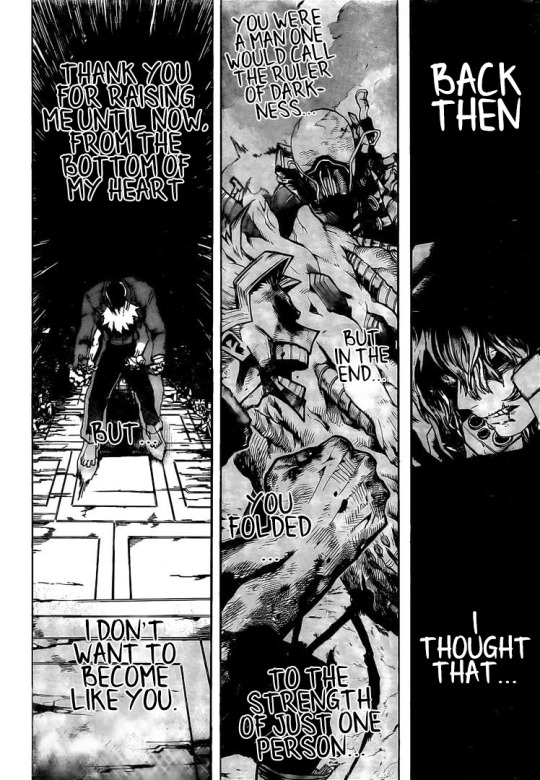
Bluish-Grey is also defined as ‘livid’, an adjective used to describe anger or decoloration of the skin (caused by bruising). This colour gives a sense of detachment - which also goes to review the colour grey and blue, in them being interpreted together as an entity, and how Tomura feels a detachment from his own memories, and past life, as well as his future (When Did We Ever Need A Future?) and instead seek meaning in everything that surrounds him.
Red and white are prominent traditional colours in Japan. Both colours are used in decorations at events which represent happiness and joy.
On a non serious note, Shigaraki’s date of birth is 4th of April, and casually the colours associated with April are Burgundy (deep red) and White (according to the Japanese etiquette).
And finally last remark for this post: it is very funny how Shigaraki’s palette is somehow almost the same as Bakugou’s (with the exception of green - which I would like to interpret as if Bakugou did not have Midoriya as his side, he could have ended in a far worse position, with no hope and no one to compare to).
Thank you for reading.
#mha#bnha#bnha meta#mha meta#mha analysis#bnha analysis#bnha color analysis#bnha theory#mha theory#mha color analysis#boku no hero academia#my hero academia#my hero academy#shigaraki tomura#shimura tenko#lov#league of villains#bnha spoilers#bnha manga#bnha manga spoilers#mha spoilers#mha manga#mha manga spoilers#dabi#Dabi is touya#todoroki touya#izuku midoriya#deku#bakugou katsuki#kacchan
77 notes
·
View notes
Text
The Tifareth Balance
I think this goes all the way back to the gnostic tree, and how everything has to be brought into balance to achieve Final Heaven.
Introduction: Where the Characters Begin in FF7
At the beginning of the story, Aerith was treated all her life as special by certain individuals - Turks, Shinra/Hojo, Elmyra, Zack. This gave her a very young Queen Victoria levels of self-importance and obstinence, very self-centered world view if you will, and that's why in OG she's always asking Cloud what he thinks about her etc (which actually implies she's rather confused that she isn't already the center of his world somehow) during dialogue options. This is also I believe partially why she seems to sense Ifalna, Elmyra’s husband, and Zack enter the Lifestream, yet seems inured when two reactors, a plate, and the related mass loss of life occurred. Surely she should have been overwhelmed by the sheer number of souls passing back into the Lifestream, yet she seems perfectly deaf to this mass upheaveal and more concerned about her own earthly affairs as she meets Cloud? Sounds oddly cold for a steward of the planet who could hear its cries, however faintly. There’s no Obiwan-Alderaan moment for her at all. Her starting point is that she misses the forest for the trees.
Meanwhile, we have Tifa, who though in her youth was the center of a circle of friends, we learn during the Lifestream that none of them actually understood her, esp obvious during her grief over her mother's death. For an introvert, this is actually a deeply socially draining experience, and since then, given how one by one her social circle deserted her and the village for job opportunities, she is left to believe she's simply a cog in the Grand Scheme. She's always had to suppress her own self and think of others before her. It doesn't matter that she probably wants to leave the village that's been emptied of her peers - she's the chief's daughter so she must stay. It doesn't matter that she disagreed over the reactor bombings, for the Greater Good Avalanche must do something to save the Planet, so she had to acquiesant against her own wishes. It was she who worried and grieved most for the two reactor bombings and the plate fall and its associated loss of life, even though she still had Cloud with her, and realistically couldn’t actually hear the cries of the Planet. Her starting point is that she misses the trees for the forest.
In other words, at the beginning of the story, Aerith is too selfish and Tifa is too selfless. And as author Rick Riordan once wrote, "The most dangerous flaws are those which are good in moderation. Evil is easy to fight. Lack of wisdom… that is very hard indeed." (Athena, The Titan's Curse)
Aerith’s Character Arc in FF7
Over the course of the story, we see Aerith, even while leveraging her position and her blood against Shinra's encroachment, was equally afraid of her own powers. She ignored and hid herself away from the problems of Gaia, hiding under the protection of Elmyra for as long as she could. She disregards opinions and feelings of others like when she totally misjudged how to handle Barret's raw emotions over Corel at the Gold Saucer. She was not at all oblivious to Tifa's feelings yet still attempted to monopolize Cloud's attentions in front of her. This behaviour can be traced back to her need to stand firm against the Turks’/Shinra’s persuasions, though when used on regular people like the team, it is very offputting, abrasive, thoughtless and likely was what actually alienated her peers from her growing up. Ultimately, she made the fatal mistake of believing she knows what's best for the group in merrily skipping off alone into the Forbidden City (I mean, sure, we all know Cloud was unstable from the Jenova manipulation but there were 7 other sane party members who could have been consulted and split up before she skipped off unprotected?), and ultimately her fatal flaw of arrogance and selfishness caused her death. Not because she meant to die, knowing it will protect the planet, because she'd always intended to return to the team ("She talked about the future more than the rest of us"), but she died anyway because her arrogance and selfishness were her fatal flaw.
I think it is only in death, though unaddressed explicitly by the game story itself (which of course remains on the living party members, and therefore is the story of life, and how life still moves on after death), that she truly grasped the littleness of who she is. That ultimately, back in the Lifestream with all the other Cetras, she was finally able to understand that in the end, she was just another Cetra in the great battle against Jenova. Sure, she was the Cetra who summoned Holy, but it was actually doing more harm than good by itself. It was only with the collective power and force of the Lifestream, of all who were born of the Planet and all who returned to the Planet, that Meteor was able to aid Aerith (Holy) in pushing back Meteor. In accepting her ordinariness among the Cetra is when Aerith truly becomes the mother of Gaia, even if nobody other than the FF7 team will ever remember her name. Her legacy lives on in Gaia, along with the legacy every other Cetra died to preserve.
Aerith's character arc is to temper her selfishnes with selflessness, to care for the welfare of all instead of the welfare of a few individuals, and to recognise that she is but a small part in the greater plan, that it is ok to not be special. Her special blood didn't stop her from dying, nor was she alone the only saviour of the Planet. In the end, I believe that Aerith's journey in FF7 is her journey to understand that no matter how special she seems to be, in the end, the Planet will still live on without her too, with Nanaki as the probable successor to her decimated race's role as the new steward of the Planet.
Tifa’s Character Arc in FF7
As for Tifa, her character arc is the complete opposite: to temper her selflessness with selfishness. How odd a concept for a protagonist! Except it goes right back to the balance necessary to achieve Final Heaven ("The most dangerous flaws are those which are good in moderation"). Tifa is shy, she is reserved, she always puts the needs and wants of others above her own, even if she disagrees. She didn't challenge Barret when she disagrees with his methods. She didn't challenge Aerith even when her own feelings were hurt, yet still she was kind in the face of such unkindness (intentional or not). She suppressed her own feelings for Cloud and tries only to behave like a friend to him even though she feels more. And most damning in her character arc, she didn't challenge Cloud over the knowledge that "I waited... but Cloud never came." It was the only piece of the Nibelheim incident she could recall clearly, but because she was too insecure in her own memories (though the rest of the Incident could be chalked up to the trauma caused by her almost dying by Masamune, Cloud's alleged absence at Nibelheim wasn't, because she had pinned her hopes on his arrival and her disappointment was palpable) she allowed what she knew to be false to stand in between them for the sake of Cloud's mental stability.
I have posited in another post that Tifa is not only the heroine of FF7 but the co-protagonist as well, or at the very least the deuteragonist. It is very telling that 10 minutes after Aerith's death, the team went snowboarding, whereas when Cloud and Tifa were both broken emotionally by Sephiroth and had their joint Heroic BSoD moment, the game experienced a timeskip. How odd that the permanent physical death of a valued party member didn't stop the game dead but the death of Cloud and Tifa's trusts in their own memories did? Yet it is important to mention as too many times already Tifa has simply been dismissed as unimportant, as simply the crutch, the guide to Cloud's story and nothing more. This could not be further from the truth. Tifa's story does not simply inform Cloud's. Tifa's story is ENTWINED with Cloud's. Even as their stories run parallel to each other's, crossing the same events, their arcs are both independent AND interdependent on each other's. Tifa is not simply a plot device or the narrator or whatever one calls Tifa in an attempt to dismiss her role in the bigger FF7 story. (And I mention this because even some Tifa fans forget this in their desire to whitewash Tifa's culpability in the Northern Crater affair, which is actually a key turning point in Tifa's hero's journey)
Someday perhaps I will write a full breakdown of Tifa’s hero’s journey (because it’s honestly frustrating to see claims – even from Tifa fans – of Tifa needing a character arc of her own when it’s always been in FF7 all along if only players will take off their protagonist/Cloud-tinted glasses) in greater detail, but for the sake of the discussion of her arc in the context of the gnostic tree and the role of balance within oneself, I will simply say this: that it is only in the death of her trust in herself, and in seeing the emotional death of the one she holds most dear (Cloud’s mental stability shattering at the Northern Crater), that she learns she cannot simply stand passively by even in the face of what she knows to be wrong, just to protect someone else’s feelings and wants. She learns that even inaction has consequences. That she has to be brave enough, assertive enough, just selfish enough to place her own needs and desires, her own thoughts and beliefs, on an equal importance to the rest of the party, even the Planet’s. That just because the world is ending, it doesn’t make her personal struggles any less important than the world’s problems, it doesn’t mean the problem can be ignored or that it will simply go away, or even that it’s unimportant in the grand scheme of things.
She erred, she fell, she “died”. And she learned, she grasped the second chance with both hands, and at Mideel, she stood firm and said, “This is where I want to be. Being with Cloud. Caring for him.” It wasn’t revenge she pursued any longer, or high-minded abstract ideals like saving the Planet. She still would help save the Planet if she could, but for once in her life, she put her foot down and make clear her own priorities – to be by the side of the one she love above all else. And she could make this decision without jeopardizing the Planet because of her ordinariness. She wasn’t imbued with special powers or special bloodlines or special keepsakes and her absence will most likely not affect the Planet’s safety or lack thereof. Even in her absence, we are sent on story missions that still ended in failure – heck, even after Cloud and Tifa rejoined, the Huge Materia space mission still failed anyway, because the point is... just because one wants to save the Planet doesn’t mean one can (after all, summoning Holy didn’t work either, at least not at first).
This is also paralleled with Tifa’s caring of Cloud: there was literally no guarantee that Cloud will ever recover from his Mako poisoning – he could be a vegetable forever, and yet this is still Tifa’s choice. This isn’t just about Cloud, but about Tifa asserting her desire to be with Cloud even in the face of both world destruction and his permanent vegetative state. This is who Tifa wants to be, who Tifa chooses to be. This isn’t something being pushed onto her as part of some “greater good” that she should ignore her own wants and needs for. (And to all those who deride Tifa as being weak for making her choices all for one man, remember that feminism isn’t about a “strong independent woman who need no man”, it’s about having the right to choose who we wish to be without being forced by any societal expectations of us. “Life doesn't make any sense without interdependence. We need each other, and the sooner we learn that, the better for us all." — Erik Erikson. If anything, Tifa choosing to stay by Cloud’s side is the very definition of feminism – it’s not about what we do, rather, that we have a right to choose without being shamed for what we choose to do)
Yet in the Lifestream is when she truly finds herself together with Cloud. She learns that, though she believed she is too ordinary to be special to anyone (remember, though she was the center of her group of friends in her youth, none of them really looked back when the time came for them, or at least she thought none did more than mere talk anyway), she was actually the reason for Cloud’s entire journey, that he reciprocated special feelings for her, that he always intended to return for her. She learned that, just as Cloud’s impetus was her reason for taking up martial arts (one of the few acts of “rebellion”/assertiveness in her youth where she was probably pressured to stay in the village either due to her father’s position or her gender), she was the reason for Cloud’s desire to be a hero too. Tifa was special in her ordinariness. She meant enough to someone who meant enough to her.
Tifa’s arc is to recognise that though she won’t ever be important to the Planet as an individual, she was important enough to the one that mattered most. It is not wrong or “selfish” to find individual love and prioritise it equal to the needs of the Planet. And in the end, it was this revelation and resolution of both her and Cloud’s mutual feelings for each other that gave Cloud the strength he’d previously only accessed from despair five years ago, the strength to defeat Sephiroth. And it was only with Sephiroth’s defeat that Holy was unleashed, and only when the Lifestream joined its chorus that the Planet was ultimately saved. In the end, it was the importance Tifa “selfishly” placed on her own wants and needs that saved Cloud, and by saving him, the Planet as well. If she’d been told that Cloud’s predicament, a single individual, was nothing in the face of the end of the world, if she hadn’t been just that little bit selfish in the face of her extreme selflessness, it might have simply brought them nothing but destruction.
Conclusion
In this sense, I believe that Aerith and Tifa were indeed developed to be two halves of the same whole. They started off as two extremes in terms of personality – Aerith was self-centered, assertive and intransigent, while Tifa was selfless, passive and insecure. Yet these are only negative traits when taken to extreme, and by meeting each other, by learning from each other, tempering and moderating each other’s behaviour, by Aerith learning to be more considerate, more humble and more persuadable (because my god, was Aerith utterly brattish and unbearable in Remake before she met Tifa), by Tifa learning to be more assertive, more confident, to take pride in herself, the two halves of a whole bring each other to balance and become better versions of themselves for it.
"The most dangerous flaws are those which are good in moderation. Evil is easy to fight. Lack of wisdom… that is very hard indeed."
P.S. tagging @enigmaphenomenon as it was your twitter thread that inspired this post. A lot of the thoughts in this impulsive post probably definitely needs a hell lot more refining by more critical minds but I hope this is a good starting point for discussion.
80 notes
·
View notes
Text
FRUITS BASKET S3 EPISODE 8 RECAP AKA THE KYORU CHRONICLES PART 2 (plus a quick recap of eps 3-7)
aaaaaaAAAAHHHHHHHHHH!!! I gotta get it out of me otherwise I won't be able to concentrate on work and I will be scrolling through the tag till the day I die. Everything from episode 3 of Season 3 literally hit me like an avalanche - literally cos I marathoned 3-7 over the weekend which I wouldn't advise unless you want an accelerated heartbeat - and I'm starting to realise... maybe I just wasn't ready for season 3. Despite asking for it, haha. Not gonna put as many screencaps for this one cos tumblr editing bay be trippin and I just don't have time nor emotional energy to be fighting with the picture uploads, sorry lol
--------------------------------------------------------------------
Episodes 3 - 7
I spoke before about how (despite my feelings about the characters) the English dub VAs for Akito and Shigure pair up really well audibly. And I think I feel the same way about both Yuki and Machi's English VAs! They both have the same soft spoken yet scratchy element to their voices almost like they are holding slightly back. Although, I'd argue that Yuki has been losing the element of slightly holding back as the anime has gone on which I wonder if the same would be included for Machi's performance?
I really like the presentation of Machi's trauma through her family's expectations to be perfect and how physical it is? How Yuki kind of encourages her to let it out in a healthy way? (Btw the whole chalk breaking scene in the meeting was SO FUCKING SMOOTH. YUKI IS A NERD BUT HE IS SO EFFORTLESSLY COOL A LOT OF THE TIME)
The age gap between Isuzu and Haru for sure isn't the worst age gap in this anime/manga but it's still a bit... hmm...
Episode 4:
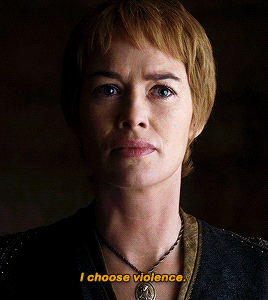
In all seriousness, I know Akito deserves some sympathy but it doesn't change the fact that I still see her as a villain. Hurt people hurt people but it doesn't mean they should get away with it, I was honestly pleased Haru got that big confrontation with Akito to tell her WHAT'S WHAT but it was also somewhat... merciful?
Hiro's growth has been so beautiful to see, him realising there are bigger things than him from the event with Rin to his relationship with Kisa to then the birth of his little sister.
Kureno choosing to get his hands a little dirtier and paying the ultimate price for it (as far as we know so far in the anime lol) was great, he is the moon side of Tohru's sunshine.
Shigure... I still don't really get him and Akito's relationship. It's clear he's waiting for Akito to grow the fuck up but at the same time he's not creating an environment for her to grow and develop. He's decided to go with the 'tough love' route which I'm still deciding whether I like it or not tbh. Sometimes it feels necessary, at other times it feels shitty. I respect that he knows he's a scumbag and I don't deny that there are people out there who take revelry in the fact that they are awful but at the same time, him remaining unchanging despite everything feels... unrealistic. But considering throughout this story he doesn't seem affected by trauma, it's understandable, I guess?
Also... that scene where Shigure ponders about whether he should've been with Tohru is THE creepiest creeper shit he's EVER done in this series. No. 🙅🏾♀️
Momiji is best bunny boi regardless of how tall and 'manly' he becomes. 🐰His scene with Akito was so authentically him and he really did that shit. We love him. <3
I love the way that the curse breaking should (on surface) be a happy event considering all the trauma the zodiac went through because of it but it's presented mostly as loss as well as happiness. It's the realness of getting out of a bad relationship
Shigure basically laying it out to Tohru how Kyo means nothing in a very taunting way was an excellently painful scene and I choose violence. It was heartbreaking seeing how worthless they all saw Kyo compared to how Tohru saw him but... by this point I was just living in the pain so 🤷🏾♀️
The story visually showing how Isuzu is more willing to be soft after her whole ordeal through her fashion choices (e.g. the pastels, the cardigans) was really nice. And Haru being happy about Isuzu making friends with Tohru was cute!
It was nice we saw that Kazuma was still wary about whether Tohru loved Kyo for the right reasons, you'd assume after everything Kazuma would love Tohru as a match for Kyo but he's so emotionally intelligent and also just a protective Dad! Yay, good parenting!
Tohru's confession to loving Kyo was amazing however I still adore Kyo's confession a little bit more. Just a bit. Lol. However, if you add the moment later in episode 8 it trumps it completely. Ethereal goddess.
Kyo and Tohru's grandfather having a scene together was great and nice
Now that I think about it, I wish there was more a visual link in the story between Tohru adapting her speech to imitate her Dad and Momiji adopting his Mum's German accent. Albeit for slightly different reasons, it just adds to the unique connection Tohru and Momiji have. In short, I'm seeing this ship with my third eye now. I get it lol
I don't wanna screencap the scene where Kyo is haunted by both his deceased mother and deceased Kyoko and potentially deceased Tohru because it's the stuff of nightmares. But, it was a wonderfully done scene. You definitely understand fully and clearly why Kyo buried all of that trauma under his hatred for Yuki (I CAN'T WAIT FOR EPISODE 9, YOU GUISE!)
If Akito is a villain, Ren is the final boss. Although, with her type of villainy... I feel like I can kind of enjoy a bit more. She reminds me of a Greek God in the ways she master manipulates people and her desperation for control and power (I just read 'Mythos' by Stephen Fry, it's a great read lol)
It lowkey feels like every female character who's comfortable in expressing their sexuality in this story is punished in some way for it... this is an incomplete thought
Shigure as a child feeling like they should all be pitied is so... mature... I feel like I need more of an explanation for why Shigure is the way he is
Akito's ego death with Kureno? Amazing. I loved that she was at least aware enough to realise how Kureno had been coddling her all this time but again... doesn't excuse her crimes
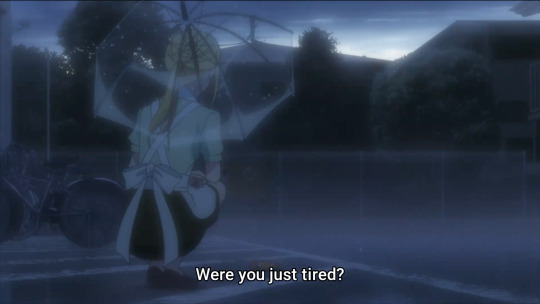

But anyways...
EPISODE 8
Honestly? I really don't have much to say about this episode besides 3-5 points I wanna get out of my head. It's not a bad thing at all, it's just that there's still a lot left to play out from this 'arc' and this season in general that I wanna complete my thoughts on.
But I'll start with this:
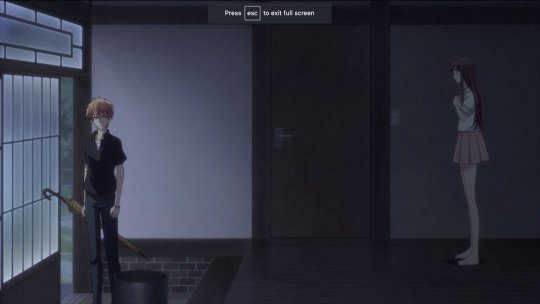
Lol, isn't it funny?! Isn't it heart-wrenchingly funny how the relationship between Kyo and Tohru has kinda reverted back to how they were at the start of the series? The coldness of Kyo at the beginning of this episode (and throughout) was a bit of a gut punch considering all the light and fluffy moments that we've gotten between the two since the True Form arc.
Talking about the True Form arc, I feel like this episode is somewhat a repeat of the same emotions, same trials of the True Form arc. Kyo still 'runs away like he always has' but this time we get him being the most honest and confrontational with his own emotions and trauma than he ever has been during the course of this whole story. While trusting someone (Tohru specifically) for the first time with the whole truth of his story! He always seems to move one step forward and then three steps backwards and while it's a tad bit frustrating, it feels very... real. I'll probably complete my feelings how this arc reflects the True Form arc when we finish this section of the story in future episode(s).
Considering the fact that 80% of this episode is Jerry Jewell monologuing as Kyo and I never got bored really just sells his performance. Kyo was being incredibly cold this episode and yet the range of emotions through his performance made it feel understandable enough for you to empathise with it.
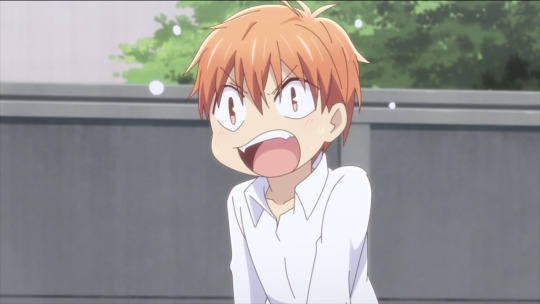
BrattyKid!Kyo to lighten the mood 😹I still wish he and Hiro had more of a relationship, I feel like they could have taught each other a lot. Well... mostly Kyo teaching Hiro tbh
Kyo rejecting Kyoka for her honesty and kindness and then later rejecting Tohru? Oh... kid...
Wow, I felt so good about that whole episode of Kid!Yuki helping Kid!Tohru get home and then it's slightly soured knowing KID!KYO was running about the streets alllll night into the morning?!?! I really did feel Kyo's frustration at not getting that win to actually do something right. And the irony of that being linked to him being unable to save Kyoka from the oncoming car?
Honestly, I don't know what my feelings are on Kyo being unable to save Kyoka. I don't even know what my feelings are on Tohru pretty much pushing that aside in favour of her feelings for Kyo. It's... complicated and I've been mulling it over in my head for the last 10+ years hahah However, if I was in Tohru's position I think I'd eventually come to a point where it feels like it's too late to really do anything about how bad I'd feel about it. Kyo's intentions weren't horrid, if anything he was just being a scared kid and he's allowed to be that. I just wish Tohru had a bit more time to evaluate it but considering she knew her mother well and assumes that wouldn't have been the full scope of what she had said, I don't have much of a problem with it in general
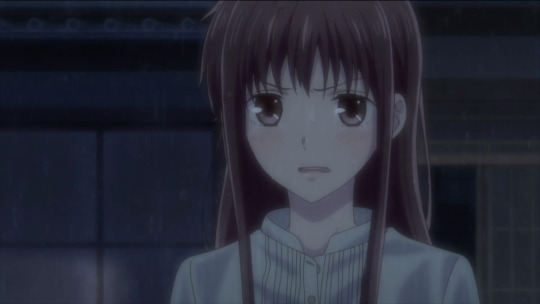
Lol, I love when Tohru gets a 'FUCK YOU, I LOVE YOU' moment with Kyo. 😂Another reflected scene from the True Form arc... only thing is that this time... it doesn't quite work. 😕
(Again, I love how all of these reflections are resolved in later occurences in response to the duality but I'll get to it next week when it shows hopefully)
Laura Bailey only had a few sentences in this episode but she killed it as always. Comparing her performance in 2001 to now is just... growth!
Ok, so Yuki automatically gets Best Boi in this episode for meddling and chasing after KYO of all people. Showing how he's personally done with hating Kyo. Realising Kyo is pretty much the only person who'll make his mother happy. I think he also lowkey wants to understand Kyo? But, we'll get to that next week.
....Oh yeah, Akito is there.
--------------------------------------------------------------
In total, I liked this episode even though it has me anxious for the next one. We finally get the full picture of why Kyo is the way he is! Ahhhh - a weight off all our chests, I'm sure. I kinda don't like that they put the ending theme at the end of these episodes - the joyfulness doesn't really match up with the intense theme? But, that's just a minor gripe. And hey, maybe they just want the audience to know... it's all gonna be okay :)
See you next week!!!
20 notes
·
View notes